Career Development Plan and Management Development: A Case Study of Thomas Cook
VerifiedAdded on 2024/05/31
|21
|4149
|217
AI Summary
This report explores the career development plan of a prospective manager at Thomas Cook, a leading travel and tourism company. It analyzes the organization's management styles, communication processes, and organizational culture. The report also includes a self-assessment of the author's managerial skills, strengths, weaknesses, opportunities, and threats (SWOT analysis). A detailed career development plan is presented, outlining objectives, targets, and strategies for enhancing communication, time management, decision-making, and leadership skills. The report concludes with a discussion on how these skills will support the author's career aspirations within Thomas Cook.
Contribute Materials
Your contribution can guide someone’s learning journey. Share your
documents today.
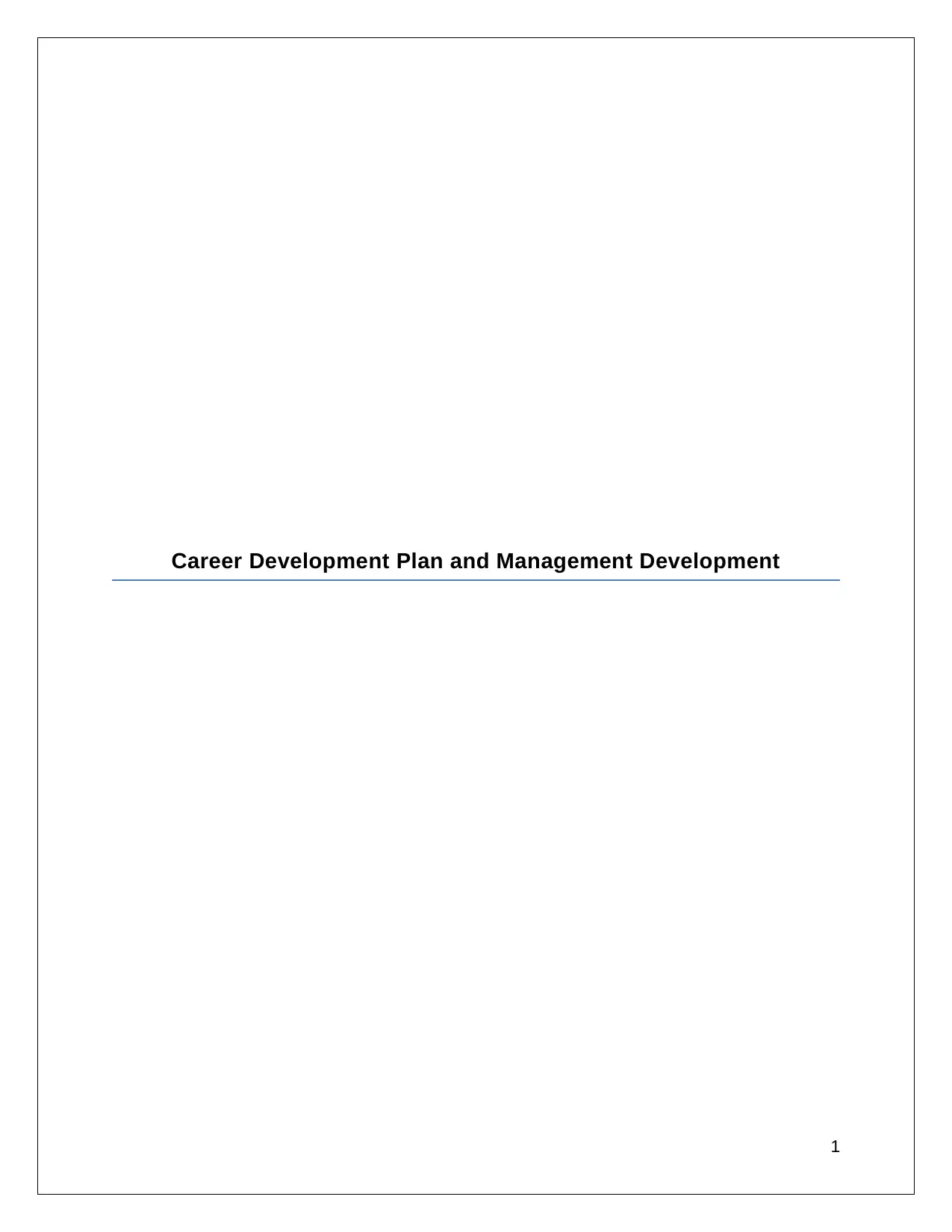
Career Development Plan and Management Development
1
1
Secure Best Marks with AI Grader
Need help grading? Try our AI Grader for instant feedback on your assignments.
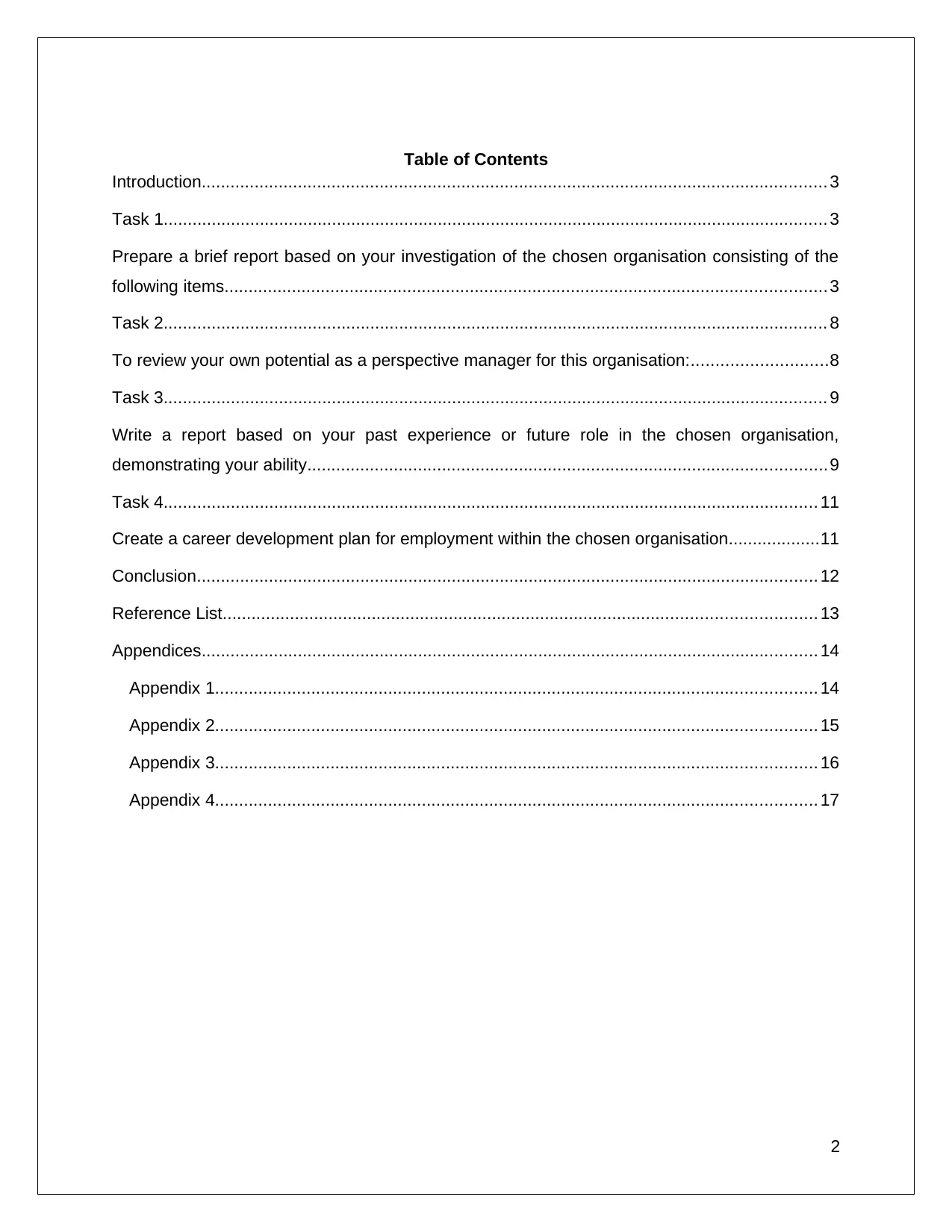
Table of Contents
Introduction.................................................................................................................................. 3
Task 1.......................................................................................................................................... 3
Prepare a brief report based on your investigation of the chosen organisation consisting of the
following items............................................................................................................................. 3
Task 2.......................................................................................................................................... 8
To review your own potential as a perspective manager for this organisation:............................8
Task 3.......................................................................................................................................... 9
Write a report based on your past experience or future role in the chosen organisation,
demonstrating your ability............................................................................................................9
Task 4........................................................................................................................................ 11
Create a career development plan for employment within the chosen organisation...................11
Conclusion................................................................................................................................. 12
Reference List........................................................................................................................... 13
Appendices................................................................................................................................ 14
Appendix 1............................................................................................................................. 14
Appendix 2............................................................................................................................. 15
Appendix 3............................................................................................................................. 16
Appendix 4............................................................................................................................. 17
2
Introduction.................................................................................................................................. 3
Task 1.......................................................................................................................................... 3
Prepare a brief report based on your investigation of the chosen organisation consisting of the
following items............................................................................................................................. 3
Task 2.......................................................................................................................................... 8
To review your own potential as a perspective manager for this organisation:............................8
Task 3.......................................................................................................................................... 9
Write a report based on your past experience or future role in the chosen organisation,
demonstrating your ability............................................................................................................9
Task 4........................................................................................................................................ 11
Create a career development plan for employment within the chosen organisation...................11
Conclusion................................................................................................................................. 12
Reference List........................................................................................................................... 13
Appendices................................................................................................................................ 14
Appendix 1............................................................................................................................. 14
Appendix 2............................................................................................................................. 15
Appendix 3............................................................................................................................. 16
Appendix 4............................................................................................................................. 17
2
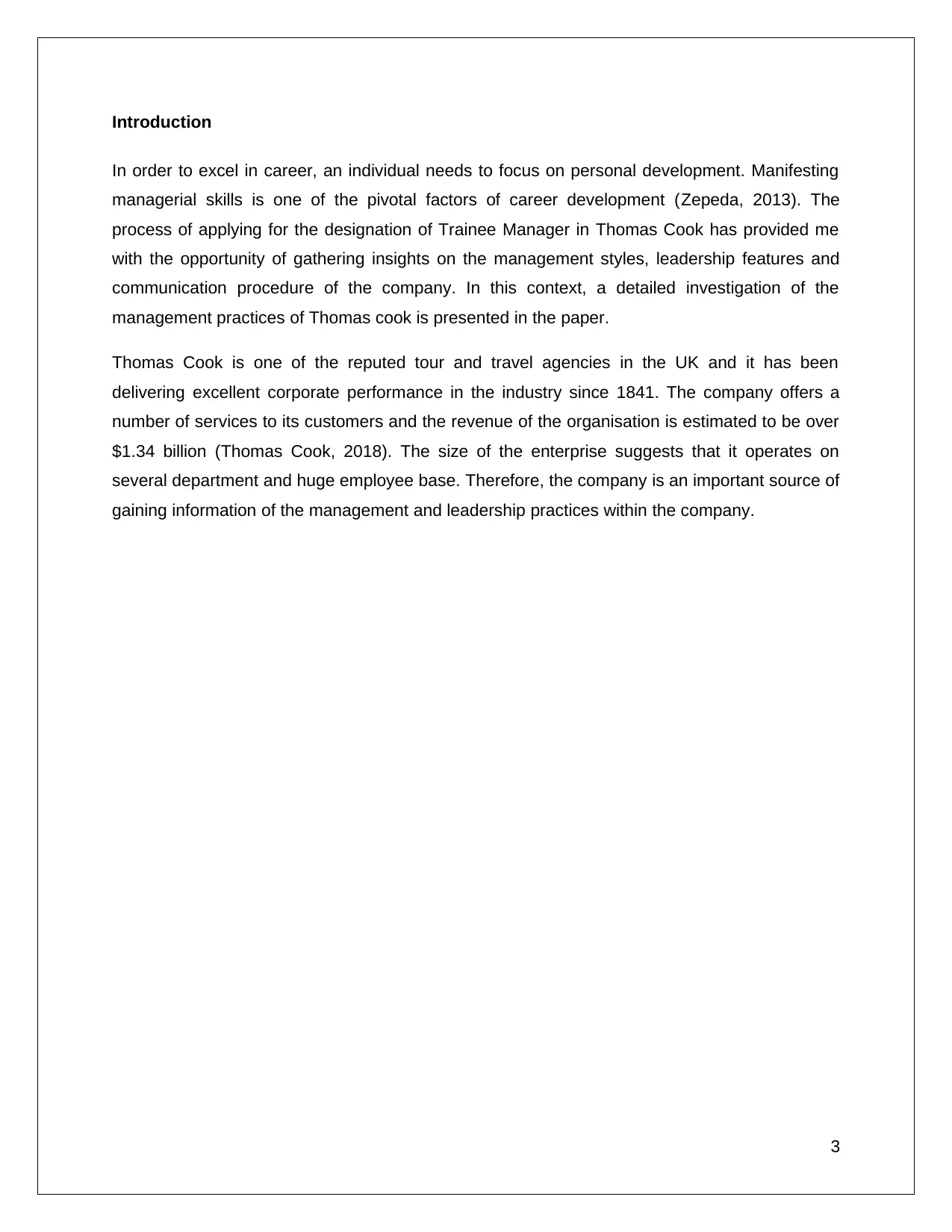
Introduction
In order to excel in career, an individual needs to focus on personal development. Manifesting
managerial skills is one of the pivotal factors of career development (Zepeda, 2013). The
process of applying for the designation of Trainee Manager in Thomas Cook has provided me
with the opportunity of gathering insights on the management styles, leadership features and
communication procedure of the company. In this context, a detailed investigation of the
management practices of Thomas cook is presented in the paper.
Thomas Cook is one of the reputed tour and travel agencies in the UK and it has been
delivering excellent corporate performance in the industry since 1841. The company offers a
number of services to its customers and the revenue of the organisation is estimated to be over
$1.34 billion (Thomas Cook, 2018). The size of the enterprise suggests that it operates on
several department and huge employee base. Therefore, the company is an important source of
gaining information of the management and leadership practices within the company.
3
In order to excel in career, an individual needs to focus on personal development. Manifesting
managerial skills is one of the pivotal factors of career development (Zepeda, 2013). The
process of applying for the designation of Trainee Manager in Thomas Cook has provided me
with the opportunity of gathering insights on the management styles, leadership features and
communication procedure of the company. In this context, a detailed investigation of the
management practices of Thomas cook is presented in the paper.
Thomas Cook is one of the reputed tour and travel agencies in the UK and it has been
delivering excellent corporate performance in the industry since 1841. The company offers a
number of services to its customers and the revenue of the organisation is estimated to be over
$1.34 billion (Thomas Cook, 2018). The size of the enterprise suggests that it operates on
several department and huge employee base. Therefore, the company is an important source of
gaining information of the management and leadership practices within the company.
3
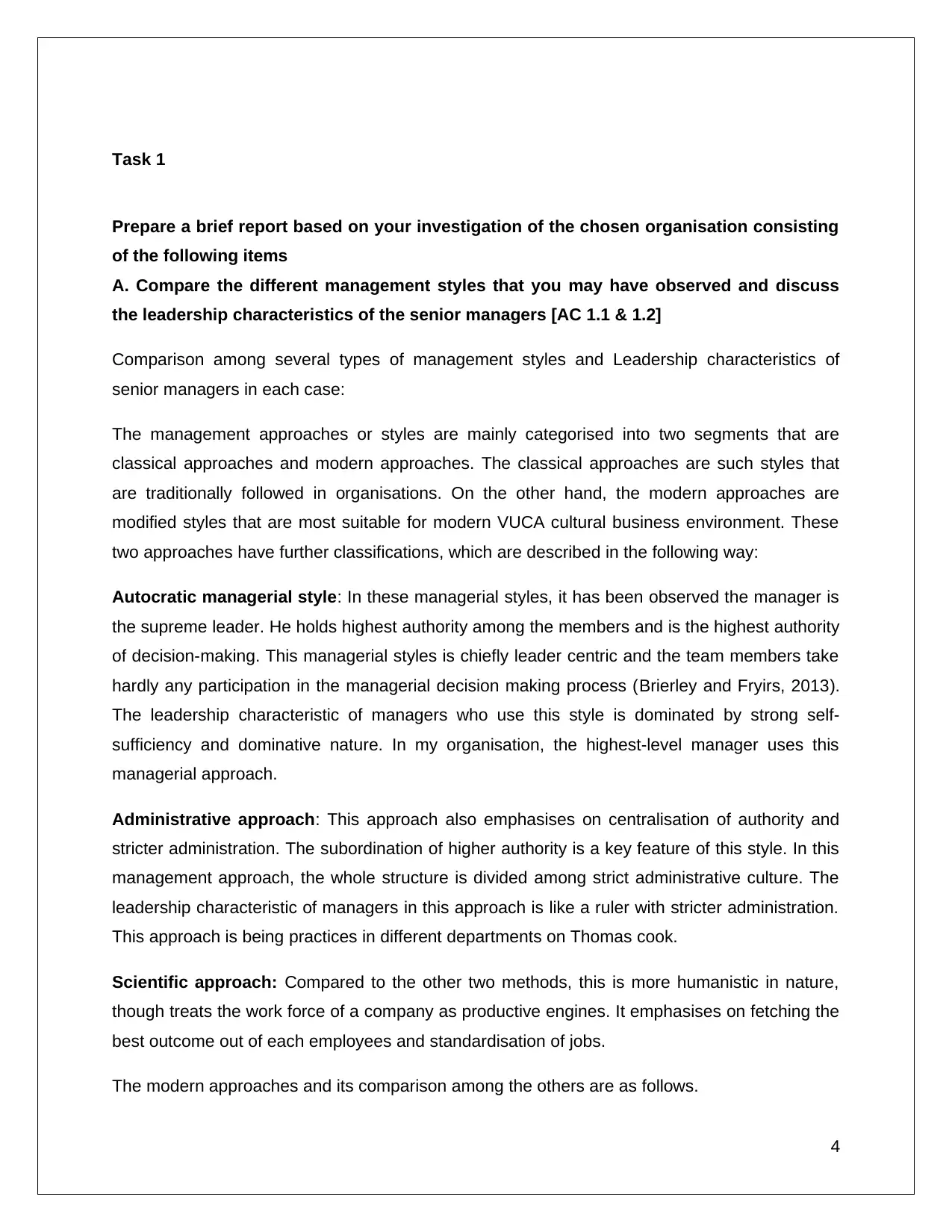
Task 1
Prepare a brief report based on your investigation of the chosen organisation consisting
of the following items
A. Compare the different management styles that you may have observed and discuss
the leadership characteristics of the senior managers [AC 1.1 & 1.2]
Comparison among several types of management styles and Leadership characteristics of
senior managers in each case:
The management approaches or styles are mainly categorised into two segments that are
classical approaches and modern approaches. The classical approaches are such styles that
are traditionally followed in organisations. On the other hand, the modern approaches are
modified styles that are most suitable for modern VUCA cultural business environment. These
two approaches have further classifications, which are described in the following way:
Autocratic managerial style: In these managerial styles, it has been observed the manager is
the supreme leader. He holds highest authority among the members and is the highest authority
of decision-making. This managerial styles is chiefly leader centric and the team members take
hardly any participation in the managerial decision making process (Brierley and Fryirs, 2013).
The leadership characteristic of managers who use this style is dominated by strong self-
sufficiency and dominative nature. In my organisation, the highest-level manager uses this
managerial approach.
Administrative approach: This approach also emphasises on centralisation of authority and
stricter administration. The subordination of higher authority is a key feature of this style. In this
management approach, the whole structure is divided among strict administrative culture. The
leadership characteristic of managers in this approach is like a ruler with stricter administration.
This approach is being practices in different departments on Thomas cook.
Scientific approach: Compared to the other two methods, this is more humanistic in nature,
though treats the work force of a company as productive engines. It emphasises on fetching the
best outcome out of each employees and standardisation of jobs.
The modern approaches and its comparison among the others are as follows.
4
Prepare a brief report based on your investigation of the chosen organisation consisting
of the following items
A. Compare the different management styles that you may have observed and discuss
the leadership characteristics of the senior managers [AC 1.1 & 1.2]
Comparison among several types of management styles and Leadership characteristics of
senior managers in each case:
The management approaches or styles are mainly categorised into two segments that are
classical approaches and modern approaches. The classical approaches are such styles that
are traditionally followed in organisations. On the other hand, the modern approaches are
modified styles that are most suitable for modern VUCA cultural business environment. These
two approaches have further classifications, which are described in the following way:
Autocratic managerial style: In these managerial styles, it has been observed the manager is
the supreme leader. He holds highest authority among the members and is the highest authority
of decision-making. This managerial styles is chiefly leader centric and the team members take
hardly any participation in the managerial decision making process (Brierley and Fryirs, 2013).
The leadership characteristic of managers who use this style is dominated by strong self-
sufficiency and dominative nature. In my organisation, the highest-level manager uses this
managerial approach.
Administrative approach: This approach also emphasises on centralisation of authority and
stricter administration. The subordination of higher authority is a key feature of this style. In this
management approach, the whole structure is divided among strict administrative culture. The
leadership characteristic of managers in this approach is like a ruler with stricter administration.
This approach is being practices in different departments on Thomas cook.
Scientific approach: Compared to the other two methods, this is more humanistic in nature,
though treats the work force of a company as productive engines. It emphasises on fetching the
best outcome out of each employees and standardisation of jobs.
The modern approaches and its comparison among the others are as follows.
4
Secure Best Marks with AI Grader
Need help grading? Try our AI Grader for instant feedback on your assignments.
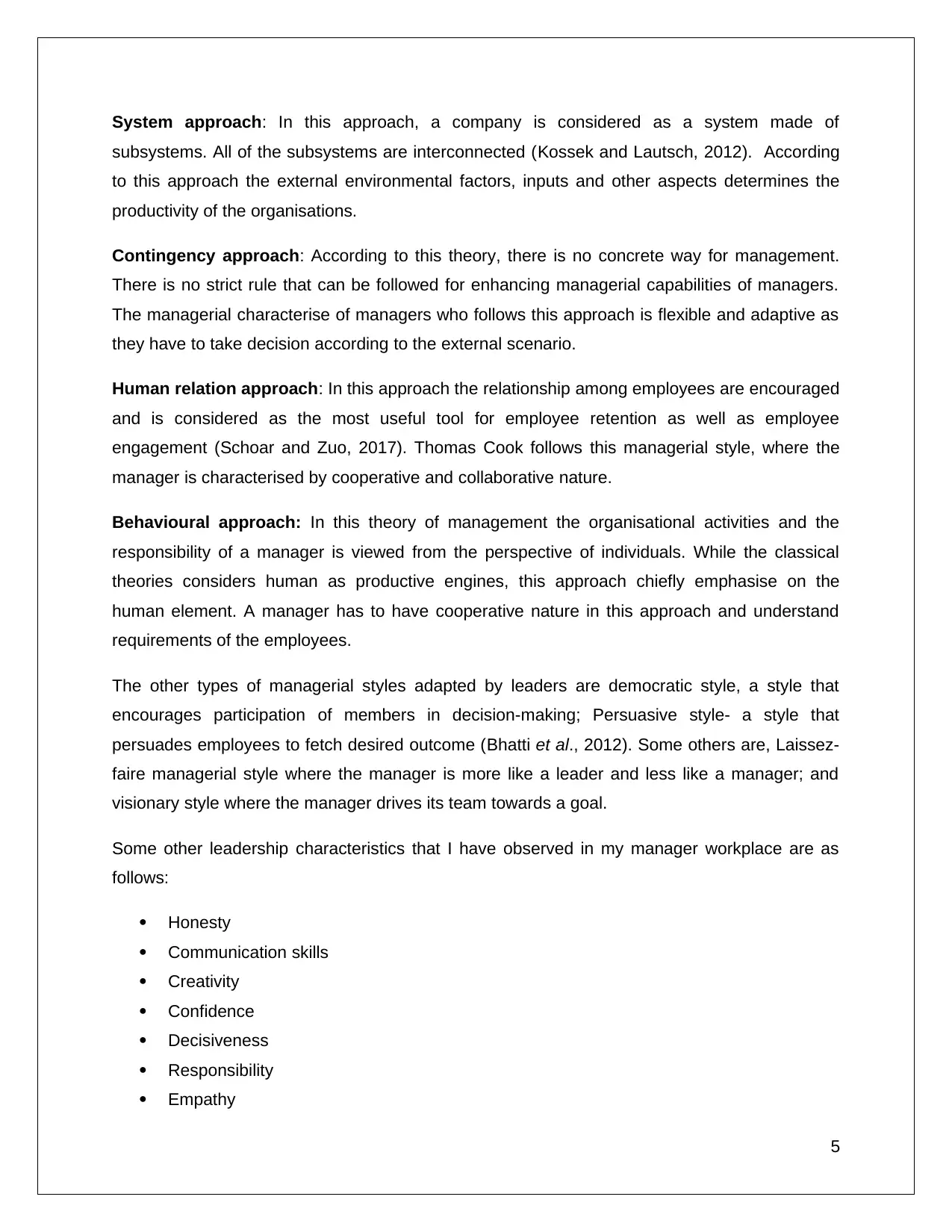
System approach: In this approach, a company is considered as a system made of
subsystems. All of the subsystems are interconnected (Kossek and Lautsch, 2012). According
to this approach the external environmental factors, inputs and other aspects determines the
productivity of the organisations.
Contingency approach: According to this theory, there is no concrete way for management.
There is no strict rule that can be followed for enhancing managerial capabilities of managers.
The managerial characterise of managers who follows this approach is flexible and adaptive as
they have to take decision according to the external scenario.
Human relation approach: In this approach the relationship among employees are encouraged
and is considered as the most useful tool for employee retention as well as employee
engagement (Schoar and Zuo, 2017). Thomas Cook follows this managerial style, where the
manager is characterised by cooperative and collaborative nature.
Behavioural approach: In this theory of management the organisational activities and the
responsibility of a manager is viewed from the perspective of individuals. While the classical
theories considers human as productive engines, this approach chiefly emphasise on the
human element. A manager has to have cooperative nature in this approach and understand
requirements of the employees.
The other types of managerial styles adapted by leaders are democratic style, a style that
encourages participation of members in decision-making; Persuasive style- a style that
persuades employees to fetch desired outcome (Bhatti et al., 2012). Some others are, Laissez-
faire managerial style where the manager is more like a leader and less like a manager; and
visionary style where the manager drives its team towards a goal.
Some other leadership characteristics that I have observed in my manager workplace are as
follows:
Honesty
Communication skills
Creativity
Confidence
Decisiveness
Responsibility
Empathy
5
subsystems. All of the subsystems are interconnected (Kossek and Lautsch, 2012). According
to this approach the external environmental factors, inputs and other aspects determines the
productivity of the organisations.
Contingency approach: According to this theory, there is no concrete way for management.
There is no strict rule that can be followed for enhancing managerial capabilities of managers.
The managerial characterise of managers who follows this approach is flexible and adaptive as
they have to take decision according to the external scenario.
Human relation approach: In this approach the relationship among employees are encouraged
and is considered as the most useful tool for employee retention as well as employee
engagement (Schoar and Zuo, 2017). Thomas Cook follows this managerial style, where the
manager is characterised by cooperative and collaborative nature.
Behavioural approach: In this theory of management the organisational activities and the
responsibility of a manager is viewed from the perspective of individuals. While the classical
theories considers human as productive engines, this approach chiefly emphasise on the
human element. A manager has to have cooperative nature in this approach and understand
requirements of the employees.
The other types of managerial styles adapted by leaders are democratic style, a style that
encourages participation of members in decision-making; Persuasive style- a style that
persuades employees to fetch desired outcome (Bhatti et al., 2012). Some others are, Laissez-
faire managerial style where the manager is more like a leader and less like a manager; and
visionary style where the manager drives its team towards a goal.
Some other leadership characteristics that I have observed in my manager workplace are as
follows:
Honesty
Communication skills
Creativity
Confidence
Decisiveness
Responsibility
Empathy
5
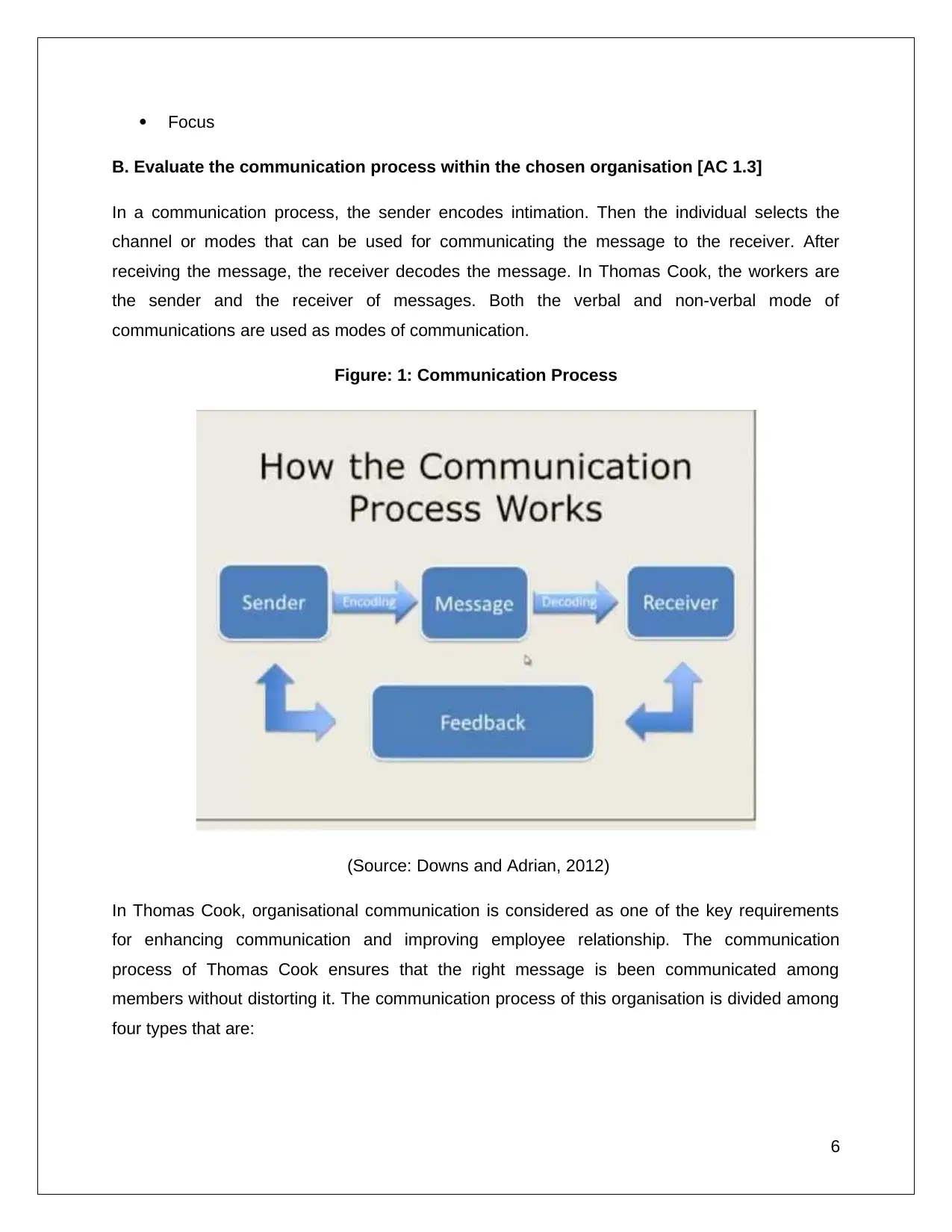
Focus
B. Evaluate the communication process within the chosen organisation [AC 1.3]
In a communication process, the sender encodes intimation. Then the individual selects the
channel or modes that can be used for communicating the message to the receiver. After
receiving the message, the receiver decodes the message. In Thomas Cook, the workers are
the sender and the receiver of messages. Both the verbal and non-verbal mode of
communications are used as modes of communication.
Figure: 1: Communication Process
(Source: Downs and Adrian, 2012)
In Thomas Cook, organisational communication is considered as one of the key requirements
for enhancing communication and improving employee relationship. The communication
process of Thomas Cook ensures that the right message is been communicated among
members without distorting it. The communication process of this organisation is divided among
four types that are:
6
B. Evaluate the communication process within the chosen organisation [AC 1.3]
In a communication process, the sender encodes intimation. Then the individual selects the
channel or modes that can be used for communicating the message to the receiver. After
receiving the message, the receiver decodes the message. In Thomas Cook, the workers are
the sender and the receiver of messages. Both the verbal and non-verbal mode of
communications are used as modes of communication.
Figure: 1: Communication Process
(Source: Downs and Adrian, 2012)
In Thomas Cook, organisational communication is considered as one of the key requirements
for enhancing communication and improving employee relationship. The communication
process of Thomas Cook ensures that the right message is been communicated among
members without distorting it. The communication process of this organisation is divided among
four types that are:
6
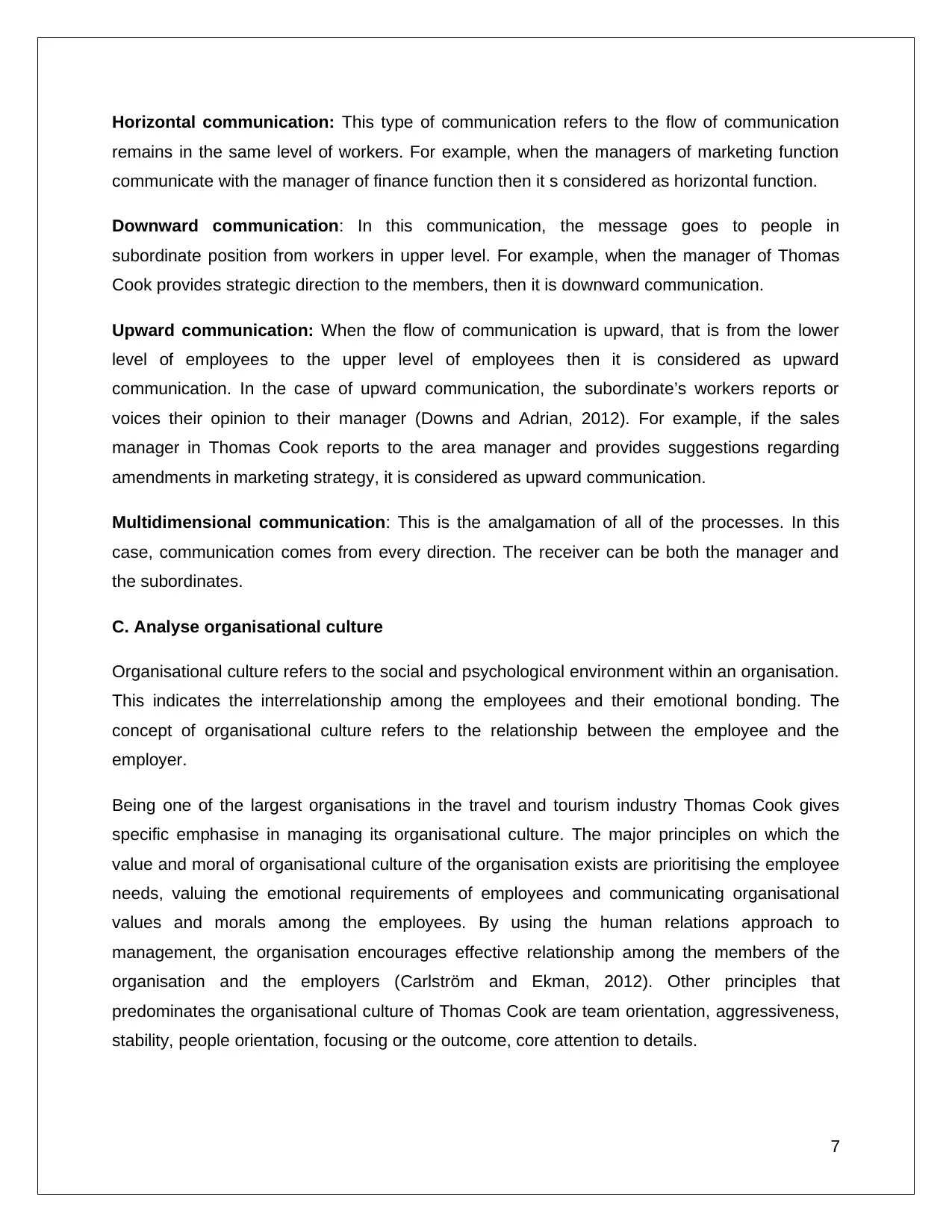
Horizontal communication: This type of communication refers to the flow of communication
remains in the same level of workers. For example, when the managers of marketing function
communicate with the manager of finance function then it s considered as horizontal function.
Downward communication: In this communication, the message goes to people in
subordinate position from workers in upper level. For example, when the manager of Thomas
Cook provides strategic direction to the members, then it is downward communication.
Upward communication: When the flow of communication is upward, that is from the lower
level of employees to the upper level of employees then it is considered as upward
communication. In the case of upward communication, the subordinate’s workers reports or
voices their opinion to their manager (Downs and Adrian, 2012). For example, if the sales
manager in Thomas Cook reports to the area manager and provides suggestions regarding
amendments in marketing strategy, it is considered as upward communication.
Multidimensional communication: This is the amalgamation of all of the processes. In this
case, communication comes from every direction. The receiver can be both the manager and
the subordinates.
C. Analyse organisational culture
Organisational culture refers to the social and psychological environment within an organisation.
This indicates the interrelationship among the employees and their emotional bonding. The
concept of organisational culture refers to the relationship between the employee and the
employer.
Being one of the largest organisations in the travel and tourism industry Thomas Cook gives
specific emphasise in managing its organisational culture. The major principles on which the
value and moral of organisational culture of the organisation exists are prioritising the employee
needs, valuing the emotional requirements of employees and communicating organisational
values and morals among the employees. By using the human relations approach to
management, the organisation encourages effective relationship among the members of the
organisation and the employers (Carlström and Ekman, 2012). Other principles that
predominates the organisational culture of Thomas Cook are team orientation, aggressiveness,
stability, people orientation, focusing or the outcome, core attention to details.
7
remains in the same level of workers. For example, when the managers of marketing function
communicate with the manager of finance function then it s considered as horizontal function.
Downward communication: In this communication, the message goes to people in
subordinate position from workers in upper level. For example, when the manager of Thomas
Cook provides strategic direction to the members, then it is downward communication.
Upward communication: When the flow of communication is upward, that is from the lower
level of employees to the upper level of employees then it is considered as upward
communication. In the case of upward communication, the subordinate’s workers reports or
voices their opinion to their manager (Downs and Adrian, 2012). For example, if the sales
manager in Thomas Cook reports to the area manager and provides suggestions regarding
amendments in marketing strategy, it is considered as upward communication.
Multidimensional communication: This is the amalgamation of all of the processes. In this
case, communication comes from every direction. The receiver can be both the manager and
the subordinates.
C. Analyse organisational culture
Organisational culture refers to the social and psychological environment within an organisation.
This indicates the interrelationship among the employees and their emotional bonding. The
concept of organisational culture refers to the relationship between the employee and the
employer.
Being one of the largest organisations in the travel and tourism industry Thomas Cook gives
specific emphasise in managing its organisational culture. The major principles on which the
value and moral of organisational culture of the organisation exists are prioritising the employee
needs, valuing the emotional requirements of employees and communicating organisational
values and morals among the employees. By using the human relations approach to
management, the organisation encourages effective relationship among the members of the
organisation and the employers (Carlström and Ekman, 2012). Other principles that
predominates the organisational culture of Thomas Cook are team orientation, aggressiveness,
stability, people orientation, focusing or the outcome, core attention to details.
7
Paraphrase This Document
Need a fresh take? Get an instant paraphrase of this document with our AI Paraphraser
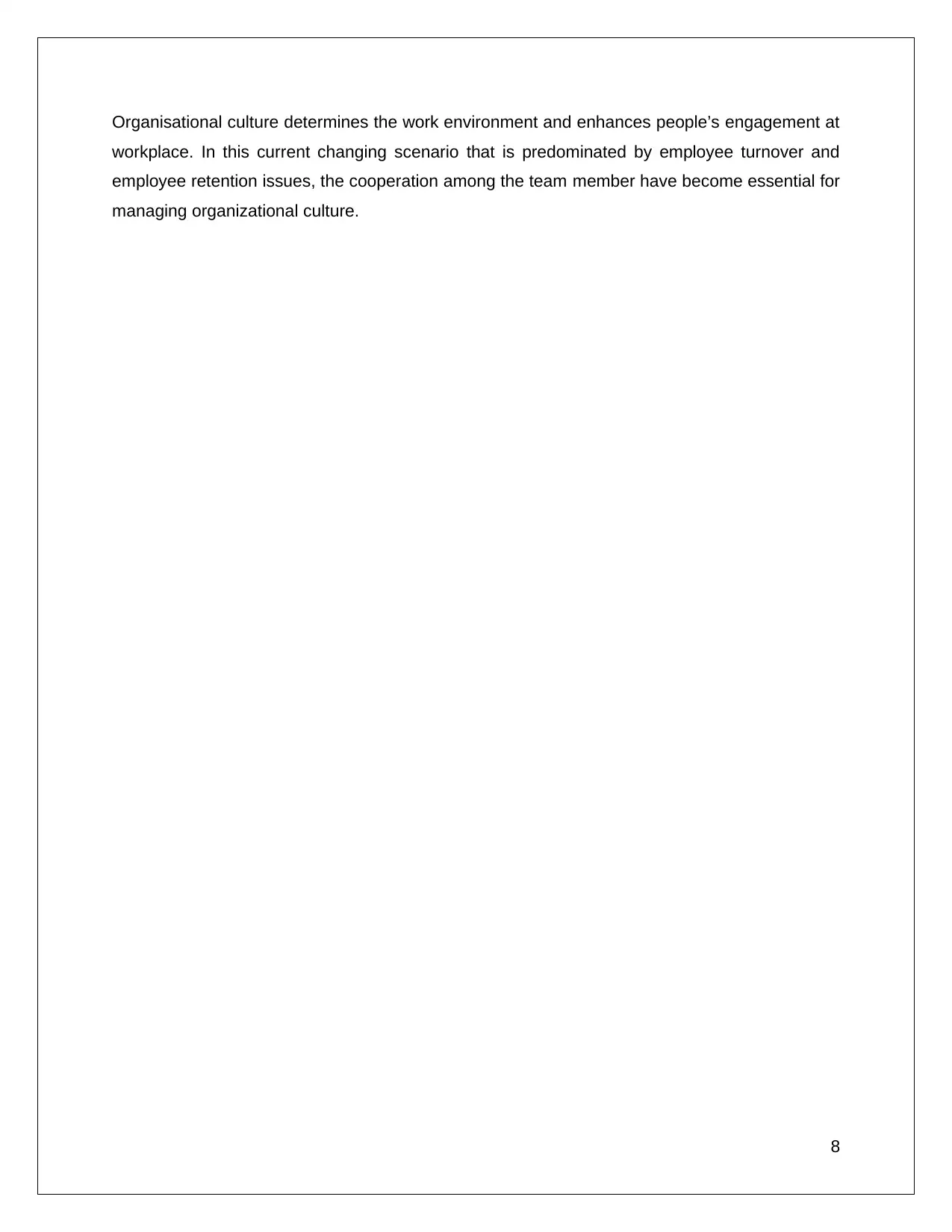
Organisational culture determines the work environment and enhances people’s engagement at
workplace. In this current changing scenario that is predominated by employee turnover and
employee retention issues, the cooperation among the team member have become essential for
managing organizational culture.
8
workplace. In this current changing scenario that is predominated by employee turnover and
employee retention issues, the cooperation among the team member have become essential for
managing organizational culture.
8
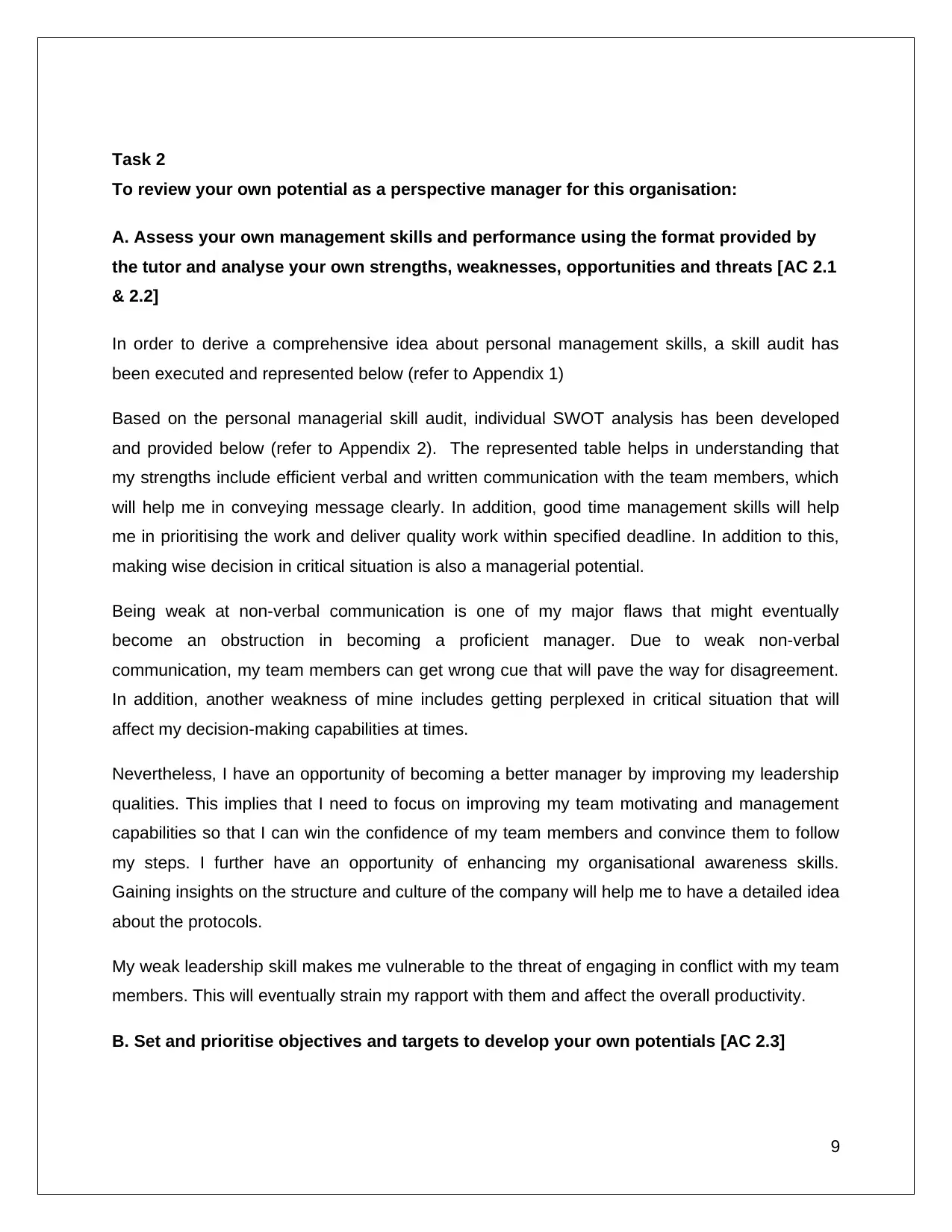
Task 2
To review your own potential as a perspective manager for this organisation:
A. Assess your own management skills and performance using the format provided by
the tutor and analyse your own strengths, weaknesses, opportunities and threats [AC 2.1
& 2.2]
In order to derive a comprehensive idea about personal management skills, a skill audit has
been executed and represented below (refer to Appendix 1)
Based on the personal managerial skill audit, individual SWOT analysis has been developed
and provided below (refer to Appendix 2). The represented table helps in understanding that
my strengths include efficient verbal and written communication with the team members, which
will help me in conveying message clearly. In addition, good time management skills will help
me in prioritising the work and deliver quality work within specified deadline. In addition to this,
making wise decision in critical situation is also a managerial potential.
Being weak at non-verbal communication is one of my major flaws that might eventually
become an obstruction in becoming a proficient manager. Due to weak non-verbal
communication, my team members can get wrong cue that will pave the way for disagreement.
In addition, another weakness of mine includes getting perplexed in critical situation that will
affect my decision-making capabilities at times.
Nevertheless, I have an opportunity of becoming a better manager by improving my leadership
qualities. This implies that I need to focus on improving my team motivating and management
capabilities so that I can win the confidence of my team members and convince them to follow
my steps. I further have an opportunity of enhancing my organisational awareness skills.
Gaining insights on the structure and culture of the company will help me to have a detailed idea
about the protocols.
My weak leadership skill makes me vulnerable to the threat of engaging in conflict with my team
members. This will eventually strain my rapport with them and affect the overall productivity.
B. Set and prioritise objectives and targets to develop your own potentials [AC 2.3]
9
To review your own potential as a perspective manager for this organisation:
A. Assess your own management skills and performance using the format provided by
the tutor and analyse your own strengths, weaknesses, opportunities and threats [AC 2.1
& 2.2]
In order to derive a comprehensive idea about personal management skills, a skill audit has
been executed and represented below (refer to Appendix 1)
Based on the personal managerial skill audit, individual SWOT analysis has been developed
and provided below (refer to Appendix 2). The represented table helps in understanding that
my strengths include efficient verbal and written communication with the team members, which
will help me in conveying message clearly. In addition, good time management skills will help
me in prioritising the work and deliver quality work within specified deadline. In addition to this,
making wise decision in critical situation is also a managerial potential.
Being weak at non-verbal communication is one of my major flaws that might eventually
become an obstruction in becoming a proficient manager. Due to weak non-verbal
communication, my team members can get wrong cue that will pave the way for disagreement.
In addition, another weakness of mine includes getting perplexed in critical situation that will
affect my decision-making capabilities at times.
Nevertheless, I have an opportunity of becoming a better manager by improving my leadership
qualities. This implies that I need to focus on improving my team motivating and management
capabilities so that I can win the confidence of my team members and convince them to follow
my steps. I further have an opportunity of enhancing my organisational awareness skills.
Gaining insights on the structure and culture of the company will help me to have a detailed idea
about the protocols.
My weak leadership skill makes me vulnerable to the threat of engaging in conflict with my team
members. This will eventually strain my rapport with them and affect the overall productivity.
B. Set and prioritise objectives and targets to develop your own potentials [AC 2.3]
9
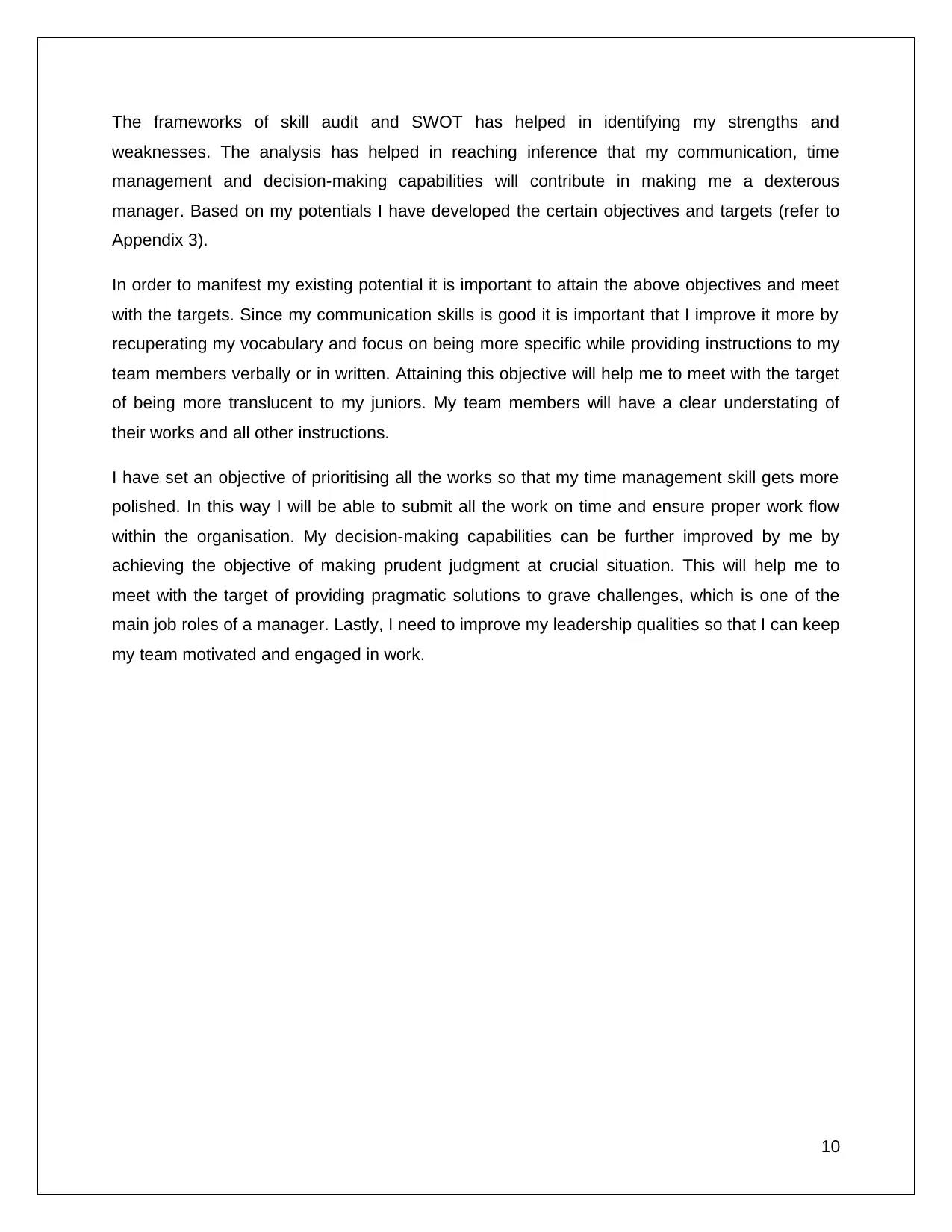
The frameworks of skill audit and SWOT has helped in identifying my strengths and
weaknesses. The analysis has helped in reaching inference that my communication, time
management and decision-making capabilities will contribute in making me a dexterous
manager. Based on my potentials I have developed the certain objectives and targets (refer to
Appendix 3).
In order to manifest my existing potential it is important to attain the above objectives and meet
with the targets. Since my communication skills is good it is important that I improve it more by
recuperating my vocabulary and focus on being more specific while providing instructions to my
team members verbally or in written. Attaining this objective will help me to meet with the target
of being more translucent to my juniors. My team members will have a clear understating of
their works and all other instructions.
I have set an objective of prioritising all the works so that my time management skill gets more
polished. In this way I will be able to submit all the work on time and ensure proper work flow
within the organisation. My decision-making capabilities can be further improved by me by
achieving the objective of making prudent judgment at crucial situation. This will help me to
meet with the target of providing pragmatic solutions to grave challenges, which is one of the
main job roles of a manager. Lastly, I need to improve my leadership qualities so that I can keep
my team motivated and engaged in work.
10
weaknesses. The analysis has helped in reaching inference that my communication, time
management and decision-making capabilities will contribute in making me a dexterous
manager. Based on my potentials I have developed the certain objectives and targets (refer to
Appendix 3).
In order to manifest my existing potential it is important to attain the above objectives and meet
with the targets. Since my communication skills is good it is important that I improve it more by
recuperating my vocabulary and focus on being more specific while providing instructions to my
team members verbally or in written. Attaining this objective will help me to meet with the target
of being more translucent to my juniors. My team members will have a clear understating of
their works and all other instructions.
I have set an objective of prioritising all the works so that my time management skill gets more
polished. In this way I will be able to submit all the work on time and ensure proper work flow
within the organisation. My decision-making capabilities can be further improved by me by
achieving the objective of making prudent judgment at crucial situation. This will help me to
meet with the target of providing pragmatic solutions to grave challenges, which is one of the
main job roles of a manager. Lastly, I need to improve my leadership qualities so that I can keep
my team motivated and engaged in work.
10
Secure Best Marks with AI Grader
Need help grading? Try our AI Grader for instant feedback on your assignments.
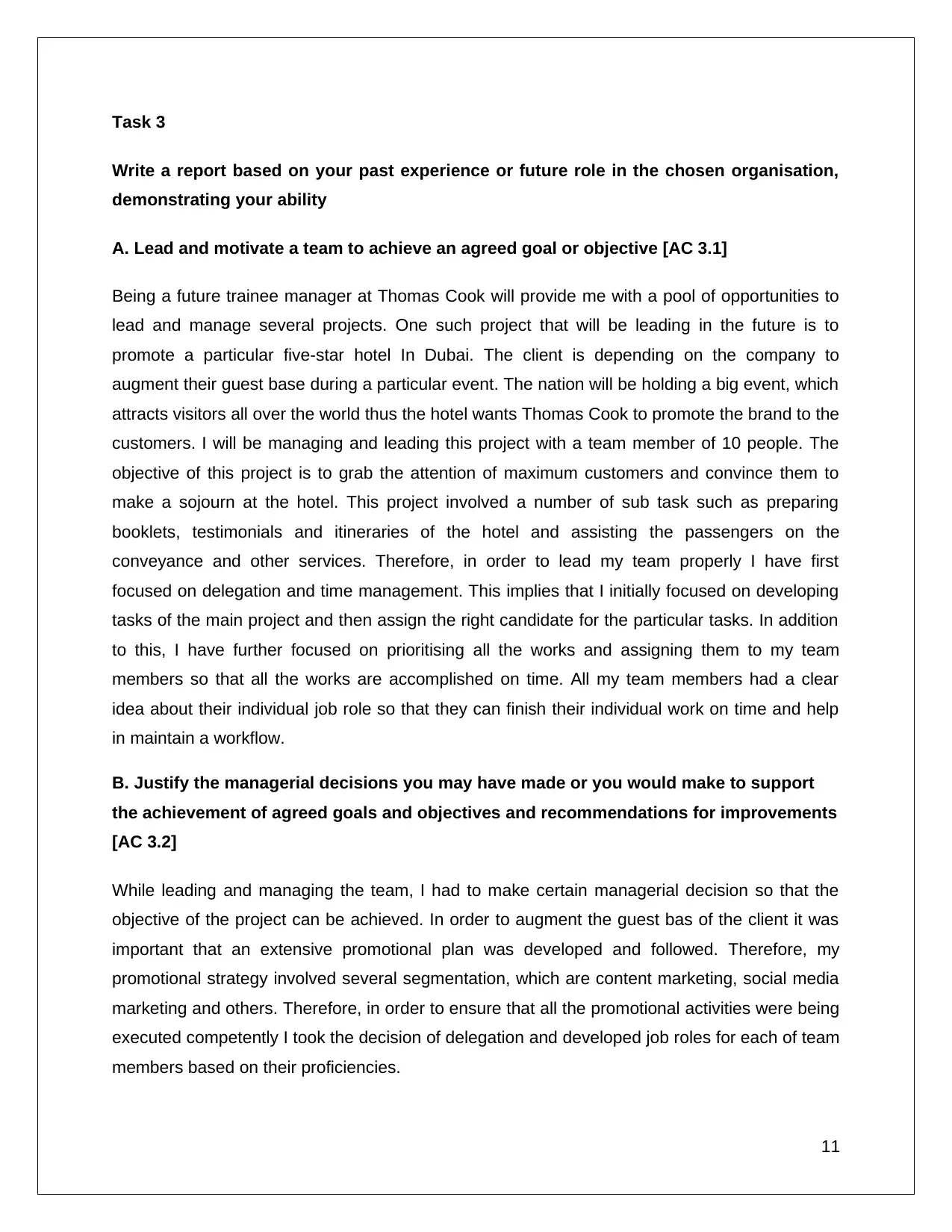
Task 3
Write a report based on your past experience or future role in the chosen organisation,
demonstrating your ability
A. Lead and motivate a team to achieve an agreed goal or objective [AC 3.1]
Being a future trainee manager at Thomas Cook will provide me with a pool of opportunities to
lead and manage several projects. One such project that will be leading in the future is to
promote a particular five-star hotel In Dubai. The client is depending on the company to
augment their guest base during a particular event. The nation will be holding a big event, which
attracts visitors all over the world thus the hotel wants Thomas Cook to promote the brand to the
customers. I will be managing and leading this project with a team member of 10 people. The
objective of this project is to grab the attention of maximum customers and convince them to
make a sojourn at the hotel. This project involved a number of sub task such as preparing
booklets, testimonials and itineraries of the hotel and assisting the passengers on the
conveyance and other services. Therefore, in order to lead my team properly I have first
focused on delegation and time management. This implies that I initially focused on developing
tasks of the main project and then assign the right candidate for the particular tasks. In addition
to this, I have further focused on prioritising all the works and assigning them to my team
members so that all the works are accomplished on time. All my team members had a clear
idea about their individual job role so that they can finish their individual work on time and help
in maintain a workflow.
B. Justify the managerial decisions you may have made or you would make to support
the achievement of agreed goals and objectives and recommendations for improvements
[AC 3.2]
While leading and managing the team, I had to make certain managerial decision so that the
objective of the project can be achieved. In order to augment the guest bas of the client it was
important that an extensive promotional plan was developed and followed. Therefore, my
promotional strategy involved several segmentation, which are content marketing, social media
marketing and others. Therefore, in order to ensure that all the promotional activities were being
executed competently I took the decision of delegation and developed job roles for each of team
members based on their proficiencies.
11
Write a report based on your past experience or future role in the chosen organisation,
demonstrating your ability
A. Lead and motivate a team to achieve an agreed goal or objective [AC 3.1]
Being a future trainee manager at Thomas Cook will provide me with a pool of opportunities to
lead and manage several projects. One such project that will be leading in the future is to
promote a particular five-star hotel In Dubai. The client is depending on the company to
augment their guest base during a particular event. The nation will be holding a big event, which
attracts visitors all over the world thus the hotel wants Thomas Cook to promote the brand to the
customers. I will be managing and leading this project with a team member of 10 people. The
objective of this project is to grab the attention of maximum customers and convince them to
make a sojourn at the hotel. This project involved a number of sub task such as preparing
booklets, testimonials and itineraries of the hotel and assisting the passengers on the
conveyance and other services. Therefore, in order to lead my team properly I have first
focused on delegation and time management. This implies that I initially focused on developing
tasks of the main project and then assign the right candidate for the particular tasks. In addition
to this, I have further focused on prioritising all the works and assigning them to my team
members so that all the works are accomplished on time. All my team members had a clear
idea about their individual job role so that they can finish their individual work on time and help
in maintain a workflow.
B. Justify the managerial decisions you may have made or you would make to support
the achievement of agreed goals and objectives and recommendations for improvements
[AC 3.2]
While leading and managing the team, I had to make certain managerial decision so that the
objective of the project can be achieved. In order to augment the guest bas of the client it was
important that an extensive promotional plan was developed and followed. Therefore, my
promotional strategy involved several segmentation, which are content marketing, social media
marketing and others. Therefore, in order to ensure that all the promotional activities were being
executed competently I took the decision of delegation and developed job roles for each of team
members based on their proficiencies.
11
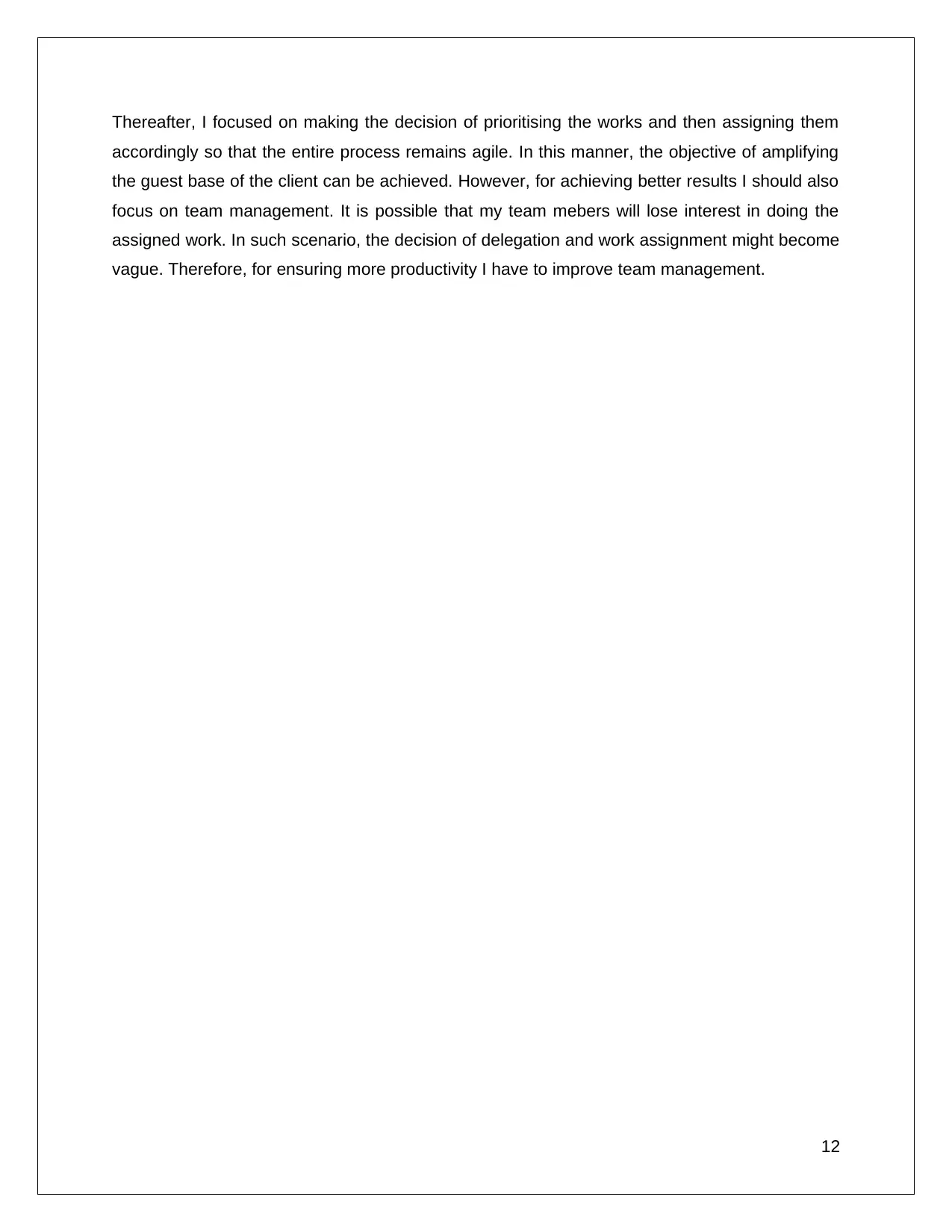
Thereafter, I focused on making the decision of prioritising the works and then assigning them
accordingly so that the entire process remains agile. In this manner, the objective of amplifying
the guest base of the client can be achieved. However, for achieving better results I should also
focus on team management. It is possible that my team mebers will lose interest in doing the
assigned work. In such scenario, the decision of delegation and work assignment might become
vague. Therefore, for ensuring more productivity I have to improve team management.
12
accordingly so that the entire process remains agile. In this manner, the objective of amplifying
the guest base of the client can be achieved. However, for achieving better results I should also
focus on team management. It is possible that my team mebers will lose interest in doing the
assigned work. In such scenario, the decision of delegation and work assignment might become
vague. Therefore, for ensuring more productivity I have to improve team management.
12
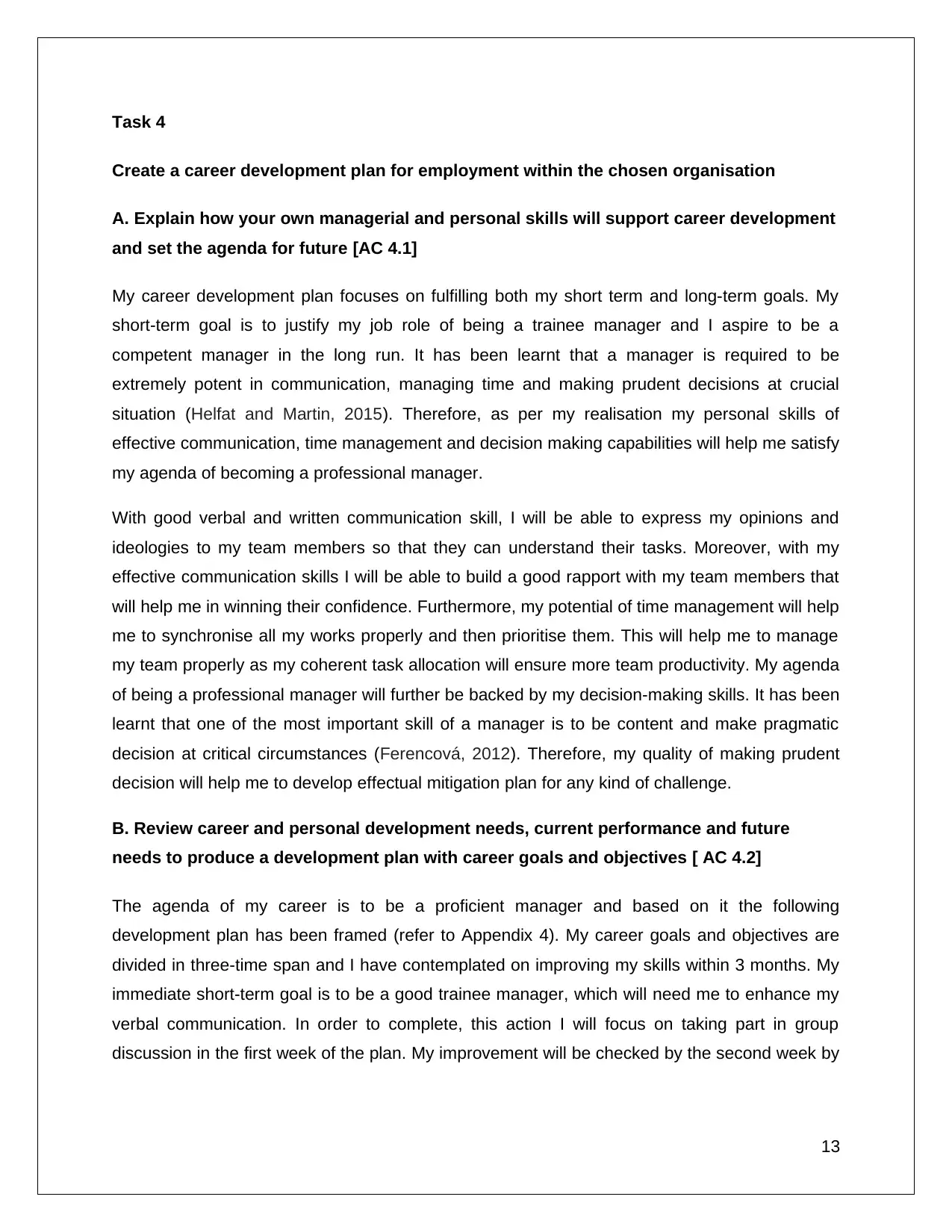
Task 4
Create a career development plan for employment within the chosen organisation
A. Explain how your own managerial and personal skills will support career development
and set the agenda for future [AC 4.1]
My career development plan focuses on fulfilling both my short term and long-term goals. My
short-term goal is to justify my job role of being a trainee manager and I aspire to be a
competent manager in the long run. It has been learnt that a manager is required to be
extremely potent in communication, managing time and making prudent decisions at crucial
situation (Helfat and Martin, 2015). Therefore, as per my realisation my personal skills of
effective communication, time management and decision making capabilities will help me satisfy
my agenda of becoming a professional manager.
With good verbal and written communication skill, I will be able to express my opinions and
ideologies to my team members so that they can understand their tasks. Moreover, with my
effective communication skills I will be able to build a good rapport with my team members that
will help me in winning their confidence. Furthermore, my potential of time management will help
me to synchronise all my works properly and then prioritise them. This will help me to manage
my team properly as my coherent task allocation will ensure more team productivity. My agenda
of being a professional manager will further be backed by my decision-making skills. It has been
learnt that one of the most important skill of a manager is to be content and make pragmatic
decision at critical circumstances (Ferencová, 2012). Therefore, my quality of making prudent
decision will help me to develop effectual mitigation plan for any kind of challenge.
B. Review career and personal development needs, current performance and future
needs to produce a development plan with career goals and objectives [ AC 4.2]
The agenda of my career is to be a proficient manager and based on it the following
development plan has been framed (refer to Appendix 4). My career goals and objectives are
divided in three-time span and I have contemplated on improving my skills within 3 months. My
immediate short-term goal is to be a good trainee manager, which will need me to enhance my
verbal communication. In order to complete, this action I will focus on taking part in group
discussion in the first week of the plan. My improvement will be checked by the second week by
13
Create a career development plan for employment within the chosen organisation
A. Explain how your own managerial and personal skills will support career development
and set the agenda for future [AC 4.1]
My career development plan focuses on fulfilling both my short term and long-term goals. My
short-term goal is to justify my job role of being a trainee manager and I aspire to be a
competent manager in the long run. It has been learnt that a manager is required to be
extremely potent in communication, managing time and making prudent decisions at crucial
situation (Helfat and Martin, 2015). Therefore, as per my realisation my personal skills of
effective communication, time management and decision making capabilities will help me satisfy
my agenda of becoming a professional manager.
With good verbal and written communication skill, I will be able to express my opinions and
ideologies to my team members so that they can understand their tasks. Moreover, with my
effective communication skills I will be able to build a good rapport with my team members that
will help me in winning their confidence. Furthermore, my potential of time management will help
me to synchronise all my works properly and then prioritise them. This will help me to manage
my team properly as my coherent task allocation will ensure more team productivity. My agenda
of being a professional manager will further be backed by my decision-making skills. It has been
learnt that one of the most important skill of a manager is to be content and make pragmatic
decision at critical circumstances (Ferencová, 2012). Therefore, my quality of making prudent
decision will help me to develop effectual mitigation plan for any kind of challenge.
B. Review career and personal development needs, current performance and future
needs to produce a development plan with career goals and objectives [ AC 4.2]
The agenda of my career is to be a proficient manager and based on it the following
development plan has been framed (refer to Appendix 4). My career goals and objectives are
divided in three-time span and I have contemplated on improving my skills within 3 months. My
immediate short-term goal is to be a good trainee manager, which will need me to enhance my
verbal communication. In order to complete, this action I will focus on taking part in group
discussion in the first week of the plan. My improvement will be checked by the second week by
13
Paraphrase This Document
Need a fresh take? Get an instant paraphrase of this document with our AI Paraphraser
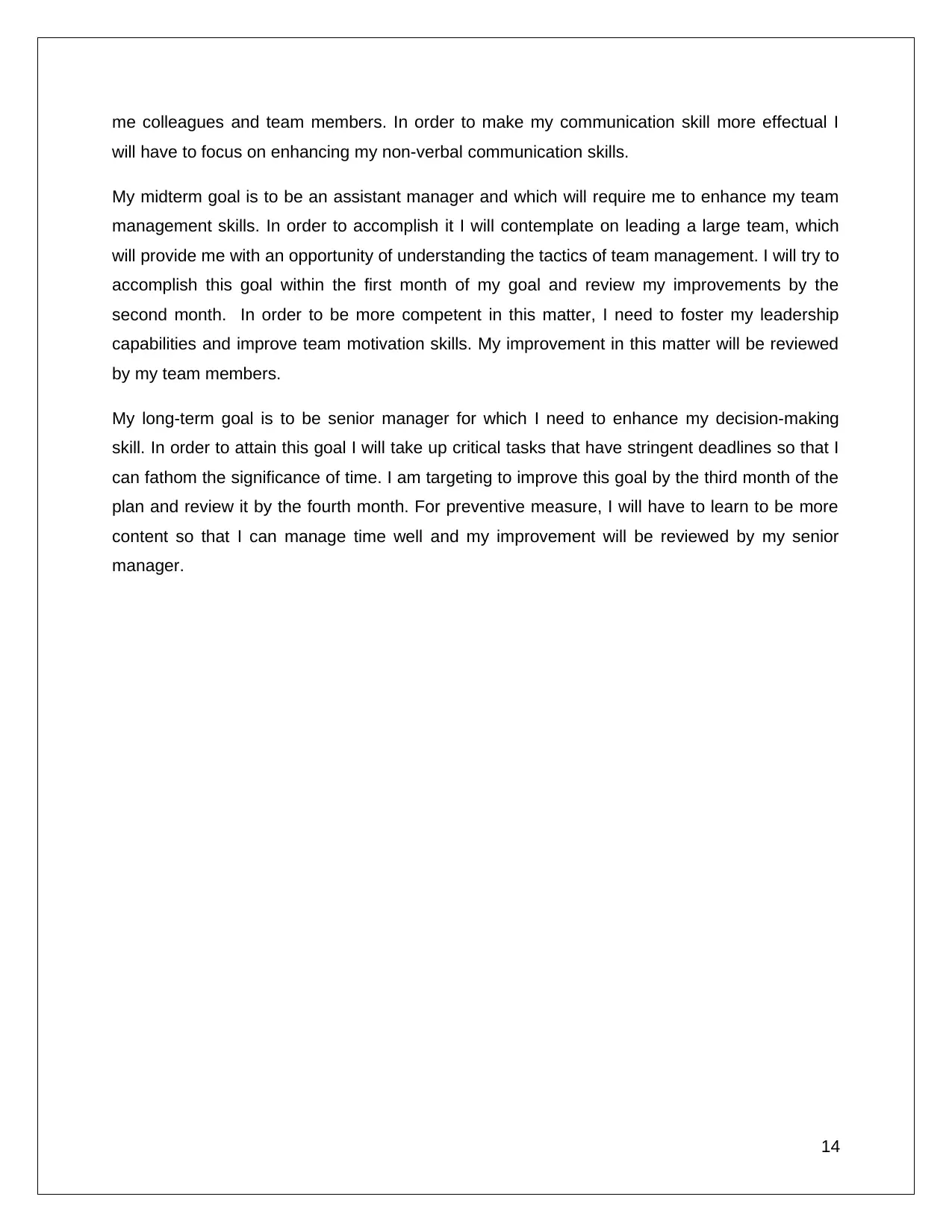
me colleagues and team members. In order to make my communication skill more effectual I
will have to focus on enhancing my non-verbal communication skills.
My midterm goal is to be an assistant manager and which will require me to enhance my team
management skills. In order to accomplish it I will contemplate on leading a large team, which
will provide me with an opportunity of understanding the tactics of team management. I will try to
accomplish this goal within the first month of my goal and review my improvements by the
second month. In order to be more competent in this matter, I need to foster my leadership
capabilities and improve team motivation skills. My improvement in this matter will be reviewed
by my team members.
My long-term goal is to be senior manager for which I need to enhance my decision-making
skill. In order to attain this goal I will take up critical tasks that have stringent deadlines so that I
can fathom the significance of time. I am targeting to improve this goal by the third month of the
plan and review it by the fourth month. For preventive measure, I will have to learn to be more
content so that I can manage time well and my improvement will be reviewed by my senior
manager.
14
will have to focus on enhancing my non-verbal communication skills.
My midterm goal is to be an assistant manager and which will require me to enhance my team
management skills. In order to accomplish it I will contemplate on leading a large team, which
will provide me with an opportunity of understanding the tactics of team management. I will try to
accomplish this goal within the first month of my goal and review my improvements by the
second month. In order to be more competent in this matter, I need to foster my leadership
capabilities and improve team motivation skills. My improvement in this matter will be reviewed
by my team members.
My long-term goal is to be senior manager for which I need to enhance my decision-making
skill. In order to attain this goal I will take up critical tasks that have stringent deadlines so that I
can fathom the significance of time. I am targeting to improve this goal by the third month of the
plan and review it by the fourth month. For preventive measure, I will have to learn to be more
content so that I can manage time well and my improvement will be reviewed by my senior
manager.
14
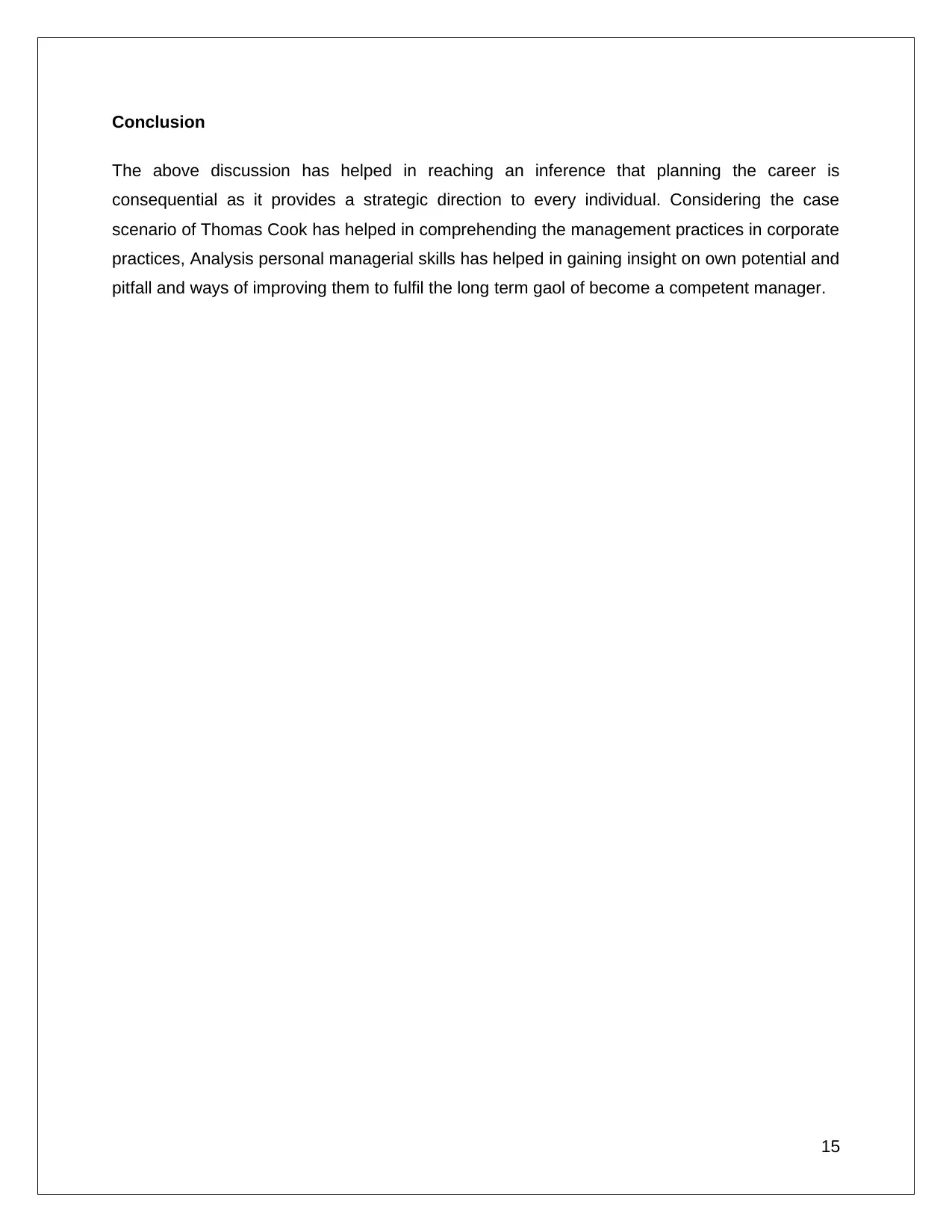
Conclusion
The above discussion has helped in reaching an inference that planning the career is
consequential as it provides a strategic direction to every individual. Considering the case
scenario of Thomas Cook has helped in comprehending the management practices in corporate
practices, Analysis personal managerial skills has helped in gaining insight on own potential and
pitfall and ways of improving them to fulfil the long term gaol of become a competent manager.
15
The above discussion has helped in reaching an inference that planning the career is
consequential as it provides a strategic direction to every individual. Considering the case
scenario of Thomas Cook has helped in comprehending the management practices in corporate
practices, Analysis personal managerial skills has helped in gaining insight on own potential and
pitfall and ways of improving them to fulfil the long term gaol of become a competent manager.
15
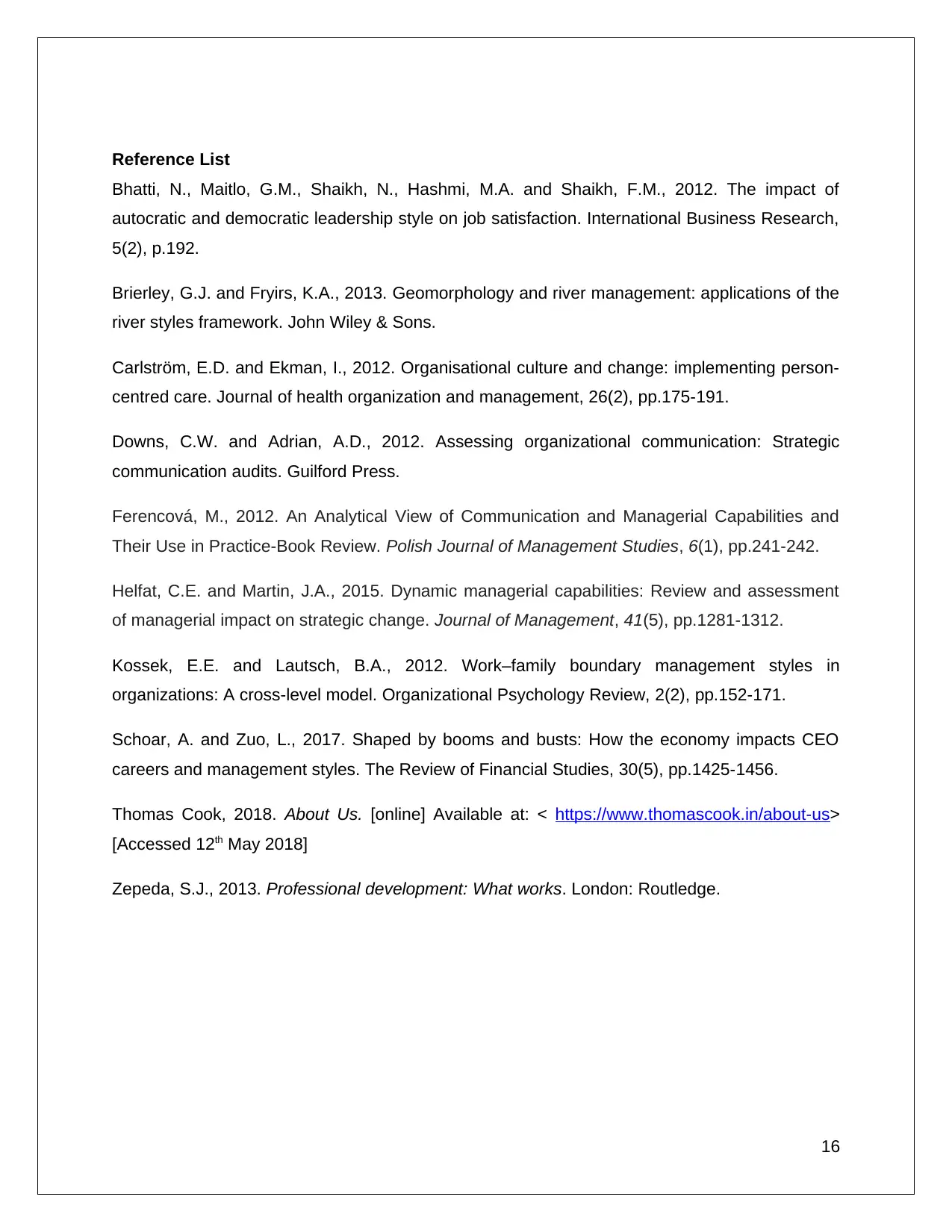
Reference List
Bhatti, N., Maitlo, G.M., Shaikh, N., Hashmi, M.A. and Shaikh, F.M., 2012. The impact of
autocratic and democratic leadership style on job satisfaction. International Business Research,
5(2), p.192.
Brierley, G.J. and Fryirs, K.A., 2013. Geomorphology and river management: applications of the
river styles framework. John Wiley & Sons.
Carlström, E.D. and Ekman, I., 2012. Organisational culture and change: implementing person-
centred care. Journal of health organization and management, 26(2), pp.175-191.
Downs, C.W. and Adrian, A.D., 2012. Assessing organizational communication: Strategic
communication audits. Guilford Press.
Ferencová, M., 2012. An Analytical View of Communication and Managerial Capabilities and
Their Use in Practice-Book Review. Polish Journal of Management Studies, 6(1), pp.241-242.
Helfat, C.E. and Martin, J.A., 2015. Dynamic managerial capabilities: Review and assessment
of managerial impact on strategic change. Journal of Management, 41(5), pp.1281-1312.
Kossek, E.E. and Lautsch, B.A., 2012. Work–family boundary management styles in
organizations: A cross-level model. Organizational Psychology Review, 2(2), pp.152-171.
Schoar, A. and Zuo, L., 2017. Shaped by booms and busts: How the economy impacts CEO
careers and management styles. The Review of Financial Studies, 30(5), pp.1425-1456.
Thomas Cook, 2018. About Us. [online] Available at: < https://www.thomascook.in/about-us>
[Accessed 12th May 2018]
Zepeda, S.J., 2013. Professional development: What works. London: Routledge.
16
Bhatti, N., Maitlo, G.M., Shaikh, N., Hashmi, M.A. and Shaikh, F.M., 2012. The impact of
autocratic and democratic leadership style on job satisfaction. International Business Research,
5(2), p.192.
Brierley, G.J. and Fryirs, K.A., 2013. Geomorphology and river management: applications of the
river styles framework. John Wiley & Sons.
Carlström, E.D. and Ekman, I., 2012. Organisational culture and change: implementing person-
centred care. Journal of health organization and management, 26(2), pp.175-191.
Downs, C.W. and Adrian, A.D., 2012. Assessing organizational communication: Strategic
communication audits. Guilford Press.
Ferencová, M., 2012. An Analytical View of Communication and Managerial Capabilities and
Their Use in Practice-Book Review. Polish Journal of Management Studies, 6(1), pp.241-242.
Helfat, C.E. and Martin, J.A., 2015. Dynamic managerial capabilities: Review and assessment
of managerial impact on strategic change. Journal of Management, 41(5), pp.1281-1312.
Kossek, E.E. and Lautsch, B.A., 2012. Work–family boundary management styles in
organizations: A cross-level model. Organizational Psychology Review, 2(2), pp.152-171.
Schoar, A. and Zuo, L., 2017. Shaped by booms and busts: How the economy impacts CEO
careers and management styles. The Review of Financial Studies, 30(5), pp.1425-1456.
Thomas Cook, 2018. About Us. [online] Available at: < https://www.thomascook.in/about-us>
[Accessed 12th May 2018]
Zepeda, S.J., 2013. Professional development: What works. London: Routledge.
16
Secure Best Marks with AI Grader
Need help grading? Try our AI Grader for instant feedback on your assignments.
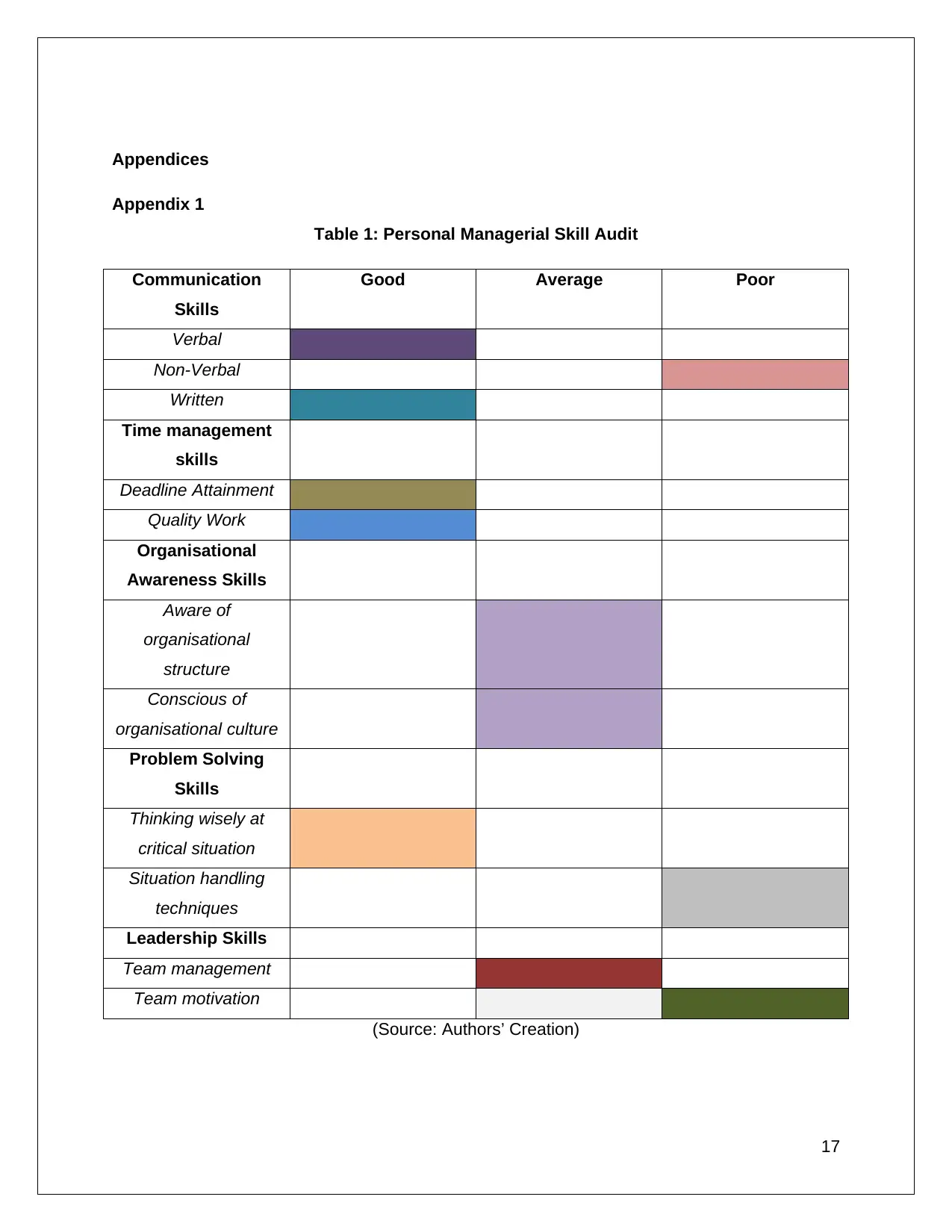
Appendices
Appendix 1
Table 1: Personal Managerial Skill Audit
Communication
Skills
Good Average Poor
Verbal
Non-Verbal
Written
Time management
skills
Deadline Attainment
Quality Work
Organisational
Awareness Skills
Aware of
organisational
structure
Conscious of
organisational culture
Problem Solving
Skills
Thinking wisely at
critical situation
Situation handling
techniques
Leadership Skills
Team management
Team motivation
(Source: Authors’ Creation)
17
Appendix 1
Table 1: Personal Managerial Skill Audit
Communication
Skills
Good Average Poor
Verbal
Non-Verbal
Written
Time management
skills
Deadline Attainment
Quality Work
Organisational
Awareness Skills
Aware of
organisational
structure
Conscious of
organisational culture
Problem Solving
Skills
Thinking wisely at
critical situation
Situation handling
techniques
Leadership Skills
Team management
Team motivation
(Source: Authors’ Creation)
17
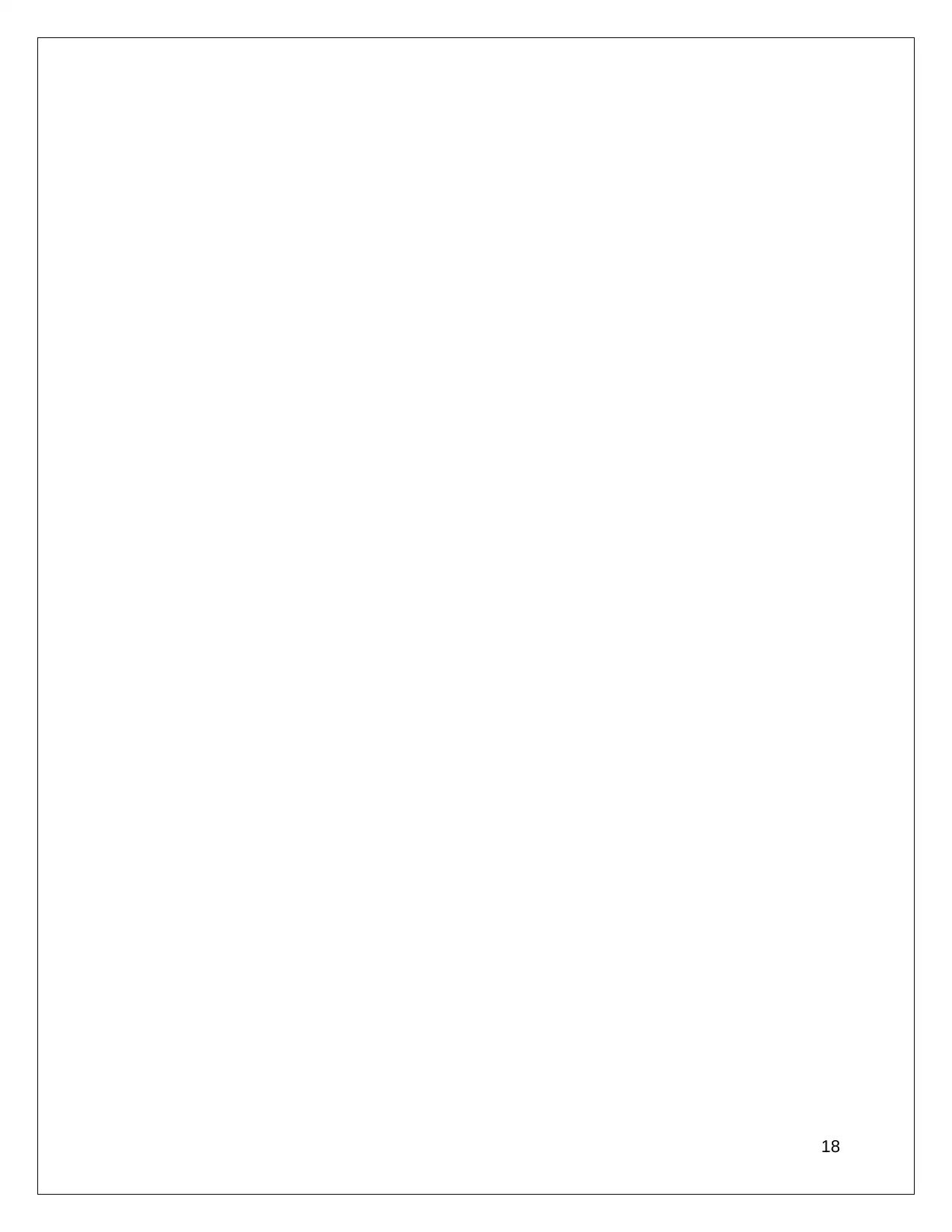
18
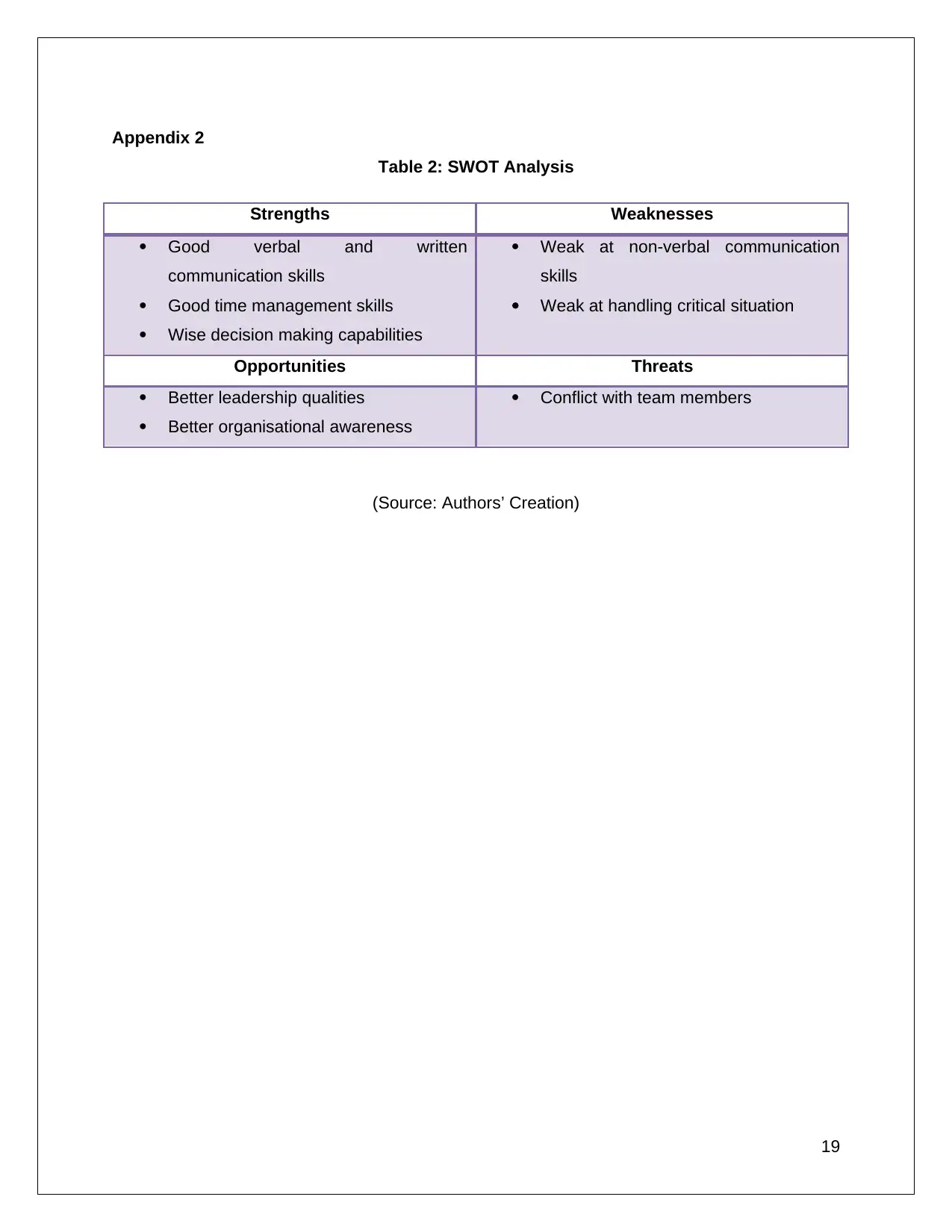
Appendix 2
Table 2: SWOT Analysis
Strengths Weaknesses
Good verbal and written
communication skills
Good time management skills
Wise decision making capabilities
Weak at non-verbal communication
skills
Weak at handling critical situation
Opportunities Threats
Better leadership qualities
Better organisational awareness
Conflict with team members
(Source: Authors’ Creation)
19
Table 2: SWOT Analysis
Strengths Weaknesses
Good verbal and written
communication skills
Good time management skills
Wise decision making capabilities
Weak at non-verbal communication
skills
Weak at handling critical situation
Opportunities Threats
Better leadership qualities
Better organisational awareness
Conflict with team members
(Source: Authors’ Creation)
19
Paraphrase This Document
Need a fresh take? Get an instant paraphrase of this document with our AI Paraphraser
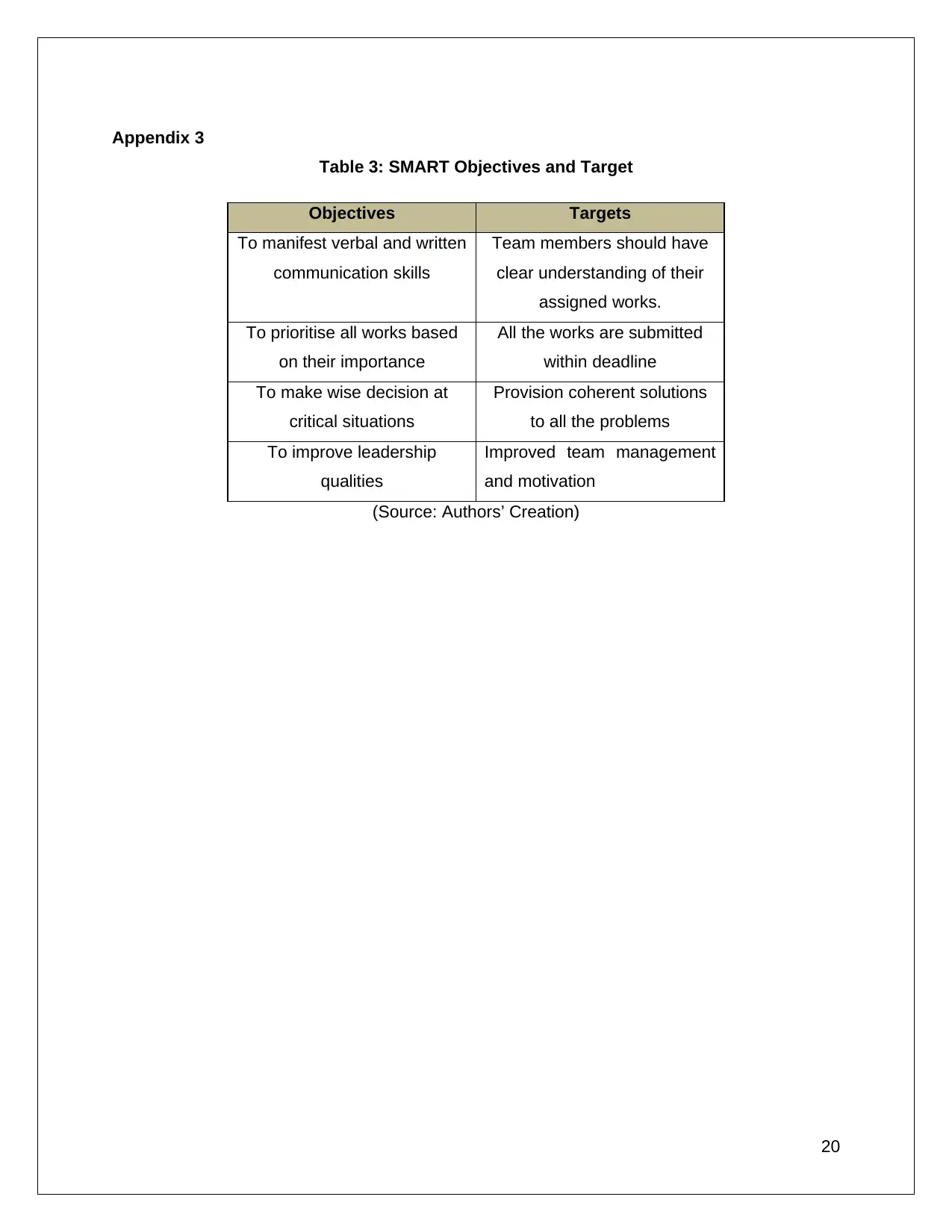
Appendix 3
Table 3: SMART Objectives and Target
Objectives Targets
To manifest verbal and written
communication skills
Team members should have
clear understanding of their
assigned works.
To prioritise all works based
on their importance
All the works are submitted
within deadline
To make wise decision at
critical situations
Provision coherent solutions
to all the problems
To improve leadership
qualities
Improved team management
and motivation
(Source: Authors’ Creation)
20
Table 3: SMART Objectives and Target
Objectives Targets
To manifest verbal and written
communication skills
Team members should have
clear understanding of their
assigned works.
To prioritise all works based
on their importance
All the works are submitted
within deadline
To make wise decision at
critical situations
Provision coherent solutions
to all the problems
To improve leadership
qualities
Improved team management
and motivation
(Source: Authors’ Creation)
20
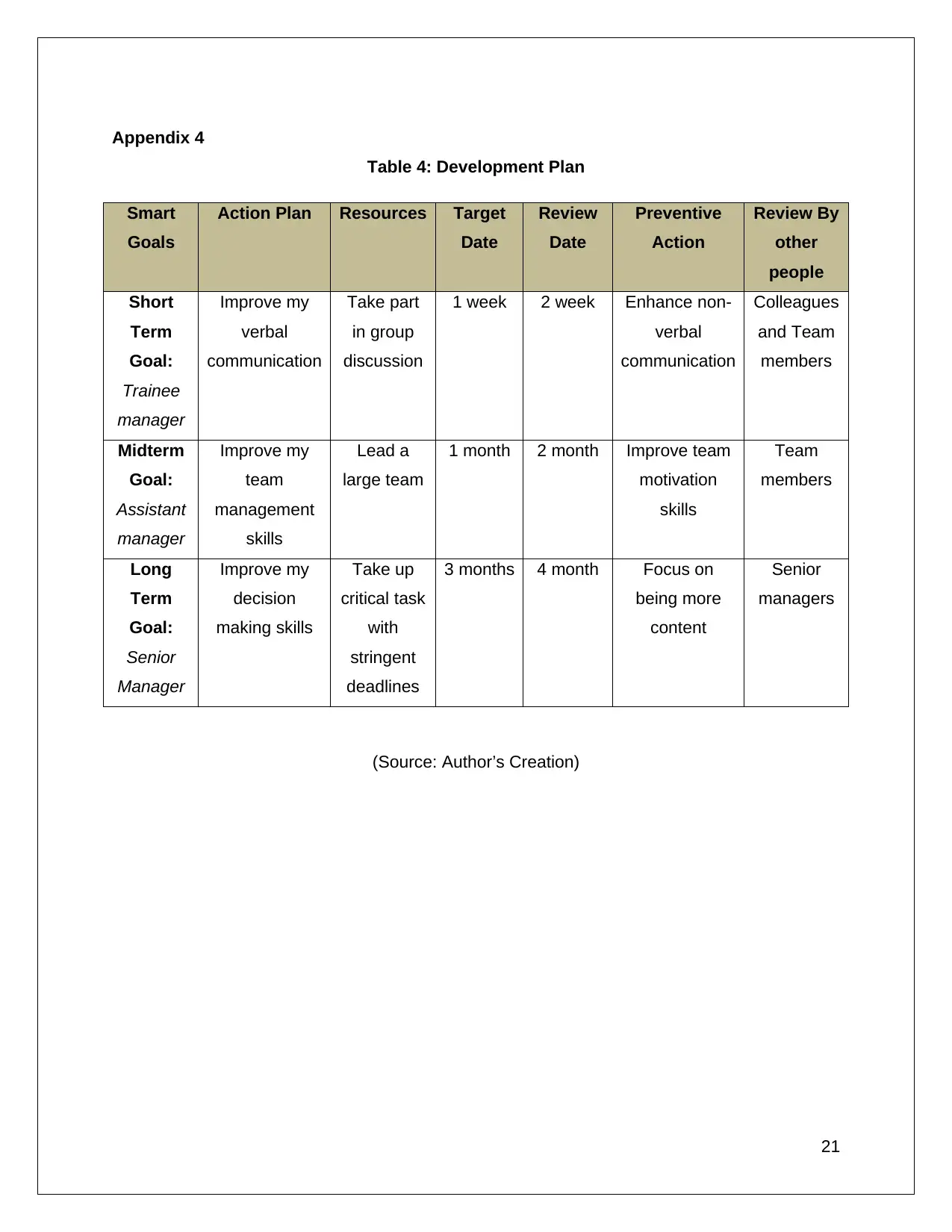
Appendix 4
Table 4: Development Plan
Smart
Goals
Action Plan Resources Target
Date
Review
Date
Preventive
Action
Review By
other
people
Short
Term
Goal:
Trainee
manager
Improve my
verbal
communication
Take part
in group
discussion
1 week 2 week Enhance non-
verbal
communication
Colleagues
and Team
members
Midterm
Goal:
Assistant
manager
Improve my
team
management
skills
Lead a
large team
1 month 2 month Improve team
motivation
skills
Team
members
Long
Term
Goal:
Senior
Manager
Improve my
decision
making skills
Take up
critical task
with
stringent
deadlines
3 months 4 month Focus on
being more
content
Senior
managers
(Source: Author’s Creation)
21
Table 4: Development Plan
Smart
Goals
Action Plan Resources Target
Date
Review
Date
Preventive
Action
Review By
other
people
Short
Term
Goal:
Trainee
manager
Improve my
verbal
communication
Take part
in group
discussion
1 week 2 week Enhance non-
verbal
communication
Colleagues
and Team
members
Midterm
Goal:
Assistant
manager
Improve my
team
management
skills
Lead a
large team
1 month 2 month Improve team
motivation
skills
Team
members
Long
Term
Goal:
Senior
Manager
Improve my
decision
making skills
Take up
critical task
with
stringent
deadlines
3 months 4 month Focus on
being more
content
Senior
managers
(Source: Author’s Creation)
21
1 out of 21
Related Documents
Your All-in-One AI-Powered Toolkit for Academic Success.
+13062052269
info@desklib.com
Available 24*7 on WhatsApp / Email
![[object Object]](/_next/static/media/star-bottom.7253800d.svg)
Unlock your academic potential
© 2024 | Zucol Services PVT LTD | All rights reserved.





